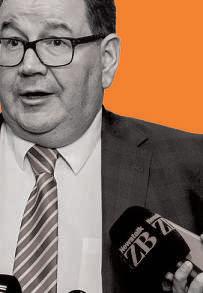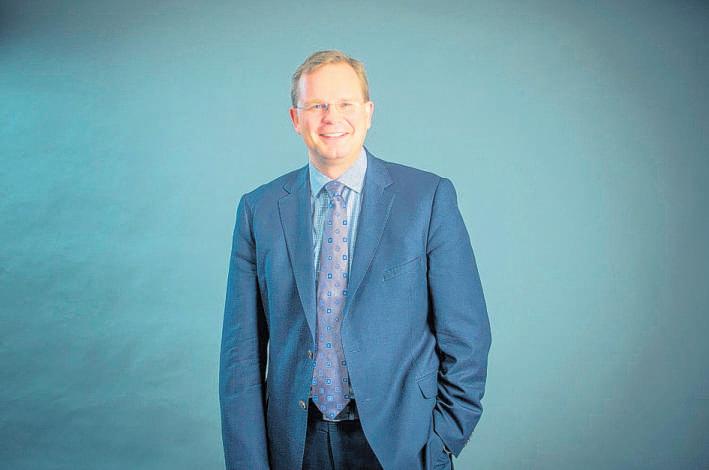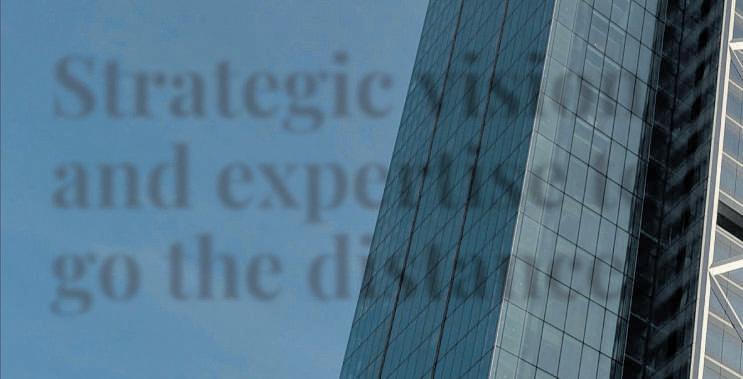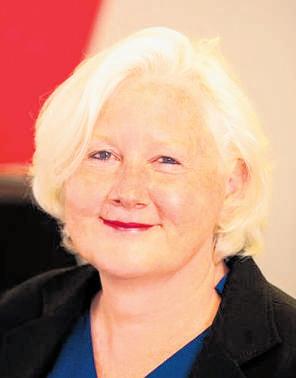


















































In amovethatarguably shouldhavecomeyears ago,theGovernmentis raisingthetrusteetax rateto39percentwith effectfrom 1April2024.

Thiswillalignthe trusteetaxratewiththe toppersonalrateand willreturn$350million peryear,solongastrust incomesremain constant.Itislikelythat someinvestmentsheld intrustswillmoveto companiesandPIEs, bothofwhichcontinue tobetaxedat a28per centrate —aproblem forthegovernmentthat ismuchhardertosolve.’
AaronQuintal,AdamNaiman(EYNZ)NewZealand’sfiscalmetricshaveseen amoderate deteriorationthroughtheforwardestimates, largelydrivenbytheimpactsoftheCovid pandemic,theNorthIslandweathereventsandthe impactofhighdomesticandglobalinflation.We expectfiscalrepairtocontinue,albeitslightly delayedthanweearlierexpected,butwillbeinline withitsfiscaltargets.Supportedbyitsfiscalpolicy framework,NewZealand’spositionremainssolid comparedwithpeersandwilllikelyenableitto respondeffectivelytoeconomicshocks.
Budget2023istheworkof aGovernmentwithits backverymuchtothewall.TheBudgetisfiscally expansionaryintheimmediateterm,reflecting thehugecostscreatedbytherecentweather events,butaimstobecontractionaryoverthe forecastperiod.

ThepoliticalriskfortheGovernmentisthat thereislittletonothingtomateriallyreducethe pressureonhouseholdbudgets,andwhatis thereistightlytargeted.Buttherewaslittle choicegiventheinflationrisk.





His‘Yeah,right’Budget is agamble.Ithingeson thehopethat everything will align perfectly.Thatinflation willconvenientlyfall. Thattheeconomywill growrobustlyenough tomanageandrepay the debt. That prosperitywillcontinue unabated.As Isaid, yeah,right. Forthecollective welfareofNewZealand, wecanonlyhopethey areright.However, placingfullconfidence inthisoutcome,given therealities oftheglobal economy,the precariousnessof predictions,andthe Government’sexecutive capability,wouldbe unwise.

 OliverHartwich(NZInitiative)
OliverHartwich(NZInitiative)

ExecutiveEditor:
O’Sullivan
Writers: DuncanBridgeman, LiamDann,JamieGray,Tim McCready
Subeditor/layouts: Isobel
Marriner Graphics: IsobelMarriner, RichardDale
Cover: RichardDale

Proofs: TimMcCready, GrahamSkellern
Online: TennessyWeir
Advertising: NeilJackson nzherald.co.nz/business
It’sclearthatthecapitalmarkets willcontinuetofacesignificant headwinds,withmanyofthe samepressuresandexternal forcesthathaveshapedthesectorin recentyearsstillinplay.
Persistentlyhighinflationremains among atopconcern.Whileitremainsstubbornlyelevated,thereare encouragingsignsthatitmayhave peakedafterconsiderableeffortfrom centralbankstoreininspending.
MuchofthesupplychaindisruptioncausedbyRussia’sinvasionof Ukrainehasstabilised,butpersistent geopoliticaltensionsandfragmentation,particularlybetweenChina andtheUnitedStates,continueto pose arisktoeconomicandfinancial stability.
Addingtothecomplexity,the pandemic-inducedglobaltalent shortageisstillacutelyfeltinmultiple sectors,includingcertainareasofthe capitalmarkets.
Gainingmomentumareseveral megatrendsthathavebecome entwinedwiththecapitalmarkets sector.Theseincludetherapidevolutionintechnology,thegrowing needforrobustcybersecuritymeasurestoprotectagainstdigitalthreats, andtheever-increasingdemandfor sustainableinvestmentoptions.
Againstthisbackdrop,hereisa wrapofsomeofthekeyissuesthat arelikelytoshapethecapitalmarkets overthecomingyear.
Despite achallengingglobaleconomicenvironment,theAsia-Pacificregionisexpectedtooffersomehope forthecomingyear.
Earlierthismonth,theInternationalMonetaryFund(IMF)released areportontheregion,notingthat despiteweakeningexternaldemand —suchasthedownturnindemand fortechexports —domesticdemand hasremainedstrong.China’sreopeningisprovidingfreshimpetustothe regionand aglimmerofoptimismfor therestoftheworld.
TheIMFprojectsAsia-Pacific’s GDPtoincreasethisyearto4.6per cent,aftergrowing3.8percentin 2022andcontributingaround70per centofglobalgrowth.Thiswillbe drivenprimarilybytherecoveryin Chinaas aresultofitsreopeningand surgingconsumption,alongwithresilientgrowthinIndia.
Itsaidthenear-termeconomic impactofChina’srecovery“willlikely varyacrosscountries,withthose moreheavilyreliantontourismlikely reapingthemostbenefit,”and expectstheriseinChina’simportsto bemoststronglyreflectedinservices.
Butdespiteitsoptimismforthe region,theIMFdowngradedits projectionsforJapan,Australia,New Zealand,SingaporeandSouthKorea.
“Strongerexternaldemandfrom Chinawillprovidesomerespiteto advancedeconomies intheregion, butisexpectedtobelargelyoutweighedbythedragfromotherdomesticandexternalfactors,”itsaid.
Mindversusmachineininvesting
Just afewmonthsago,ChatGPTwas launchedpubliclyandhasquickly disruptedmyriadsectors.
AnalystsatGoldmanSachsbelieve artificialintelligence(AI)algorithms couldultimatelyreplace300million jobs,andwithitsabilitytointerpret vastamountsofdataandidentify patterns,AIisexpectedtosignificantlydisruptthecapitalmarkets.

Recently,theUniversityofFlorida analysedtheaccuracyofChatGPTin predictingwhether anewsitem wouldaffectstockpricespositively ornegatively.
TheresultsshowedAIcouldmake accuratepredictionsonstockperformanceanddemonstratedthattraditionalmodelsdidnotprovideany furtherpredictivepowerover ChatGPT.
SinceAIalgorithmscanprocess marketdatainreal-time,theycan reacttochangesfasterthanever before.Thiswillinevitablyleadto morealgorithmictrading,where machinesareabletomaketradesat
theappropriatetimewithouthuman intervention.
Financialfirmsarealreadyusing AItounderstandtheircustomers better.Asthistoolisrefined,itwill beabletoassistindevelopingmore personalisedproductsandservices basedoncustomerbehaviourand potentiallyotherpublicdata,suchas socialmediaactivity.
AI-driventechnologiesarealsobeingusedtodetectfraudandmoney laundering.Byanalysinglargepools ofdataandidentifyingsuspicious patterns,AIcanhelpfinancial institutionspreventfraudfarmore quicklythanbefore.
WhileAIoffersanexcitingfuture forthecapitalmarkets,thereare someconcernsthatitsincreaseduse couldhavenegativeconsequences, suchascreatingmarketbubblesor amplifyingfinancialinstability.But despitethat,therapidintroductionof AItoolsmeansthatbythistimenext year,theywillundoubtedlyhavehad asignificantimpactonthesector, offeringfasterandmoreaccurate decision-makingandanalysis.
ESGfocusremainshighbut pushbackisgrowing InvestingwithESGprinciplesinmind hasbecome ahottopicandthefastest-growingsegmentoftheasset managementindustry.
ESGprinciplesconsiderenvironmental,socialandgovernancefactorsalongside financials.
Ethicalinvestmentprinciplessaw companiesunwindtheirinvestments inRussialastyearandthepandemic highlightedtheneedtoconsider societalimpactsalongsideinvestments. Locally,therecentclimateevents highlightedtheimportanceof integratingESGfactorsintoinvestmentstrategies.
Despitegrowinginterestinsustainableinvesting,thenumberofnew sustainablefundlauncheshasdeclinedthisyear,accordingtofinancial servicesfirmMorningstar.Regulatory
uncertaintyandincreasingconcerns aboutgreenwashingarelikelycontributingtothistrend,highlightingthe needforgreatertransparencyand accountabilityintheESGspace.
Butwhilemajorinvestorscontinuetoemphasisetheimportance andperformanceofESGinvesting, someofWallStreet’slargestasset managers,privateequityfirmsand brokershavewarnedthat abacklash againstsustainableinvestinghasbecome asignificantrisk.
LarryFink,CEOofBlackRock— oneoftheworld’slargestassetmanagers —wasoneoftheearlyandvocal supportersofESGandstakeholder capitalism.However,inhisannual letterthisyear,hede-emphasised ESGinvestingandentirelyavoided usingthethree-letteracronym.
ESGhasbecome acomplexand challengingtopic,particularlyinthe UnitedStates,whereanti-ESGsentimenthasgainedmomentum.Republicangovernorsfromatleast19US stateshavepledgedtoresistESG investing,andhigh-profileRepublicanfiguresMitchMcConnellandRon DeSantishavecampaignedagainst theuseofstrategiesthatpenalise fossilfuelproducers.
AccordingtoFink,Republican statetreasurerswithdrewaround US$4billionfromBlackRocklastyear.
ThereareindicationsthatUSinvestors’interestingreeninvestingis waningduetorepeatedattackson “wokecapitalism”.
ScepticismtowardsESGinvesting islikelycompoundedbythepoor performancerecentlybytechnology stocks —a sectorthatgreenfunds typicallyfavour.

Alternativeinvestments,or“alts”,are gainingpopularityandfindingtheir wayintotheportfoliosofeveryday investors.
Theseinvestments,whichinclude hedgefunds,privateequity,venture
capital,cryptocurrencies,commoditiesandrarecollectables,havelittle ornocorrelationwithtraditional assetclasseslikestocksandbonds, providinginvestorswithmorediversificationoptions.
Thealternativeinvestmentindustrygainedmomentumandaccessibilityaftertheeconomicdownturnin 2008.Withlastyear’svolatilestock marketandtheanticipationofslower growthandpersistentlyhighinflation,demandforalternativeinvesting continuestorise.
Previously,alternativeassetswere onlyeasilyaccessibletosophisticatedinvestors.However,thegrowing numberofalternativeexchangetradedfunds(ETFs)andmanaged fundsaremakingthemmoremainstream,asinvestorslookbeyondconventionalassetclassesforreturnsin anunpredictableyear.
AlleyesonOctober
Theupcominggeneralelectionis poisedtohave asignificantimpacton NewZealand’scapitalmarkets.
CurrentpollingsuggestsLabour versusNationalcouldbeoneofthe closestcontestsinsometime,and likelytohingeonthedecisionsof kingmakercoalitionparties —potentiallyTePa¯tiMa¯oriorNewZealand First.
Electionsareviewedassignificant riskeventsformarketparticipants duetothepotentialchangesingovernmentpolicyandassociateduncertainty.
Itisalreadyclearthatwealthinequality,taxandinflationwillfeature prominentlyintheupcomingpoliticaldebatesandinvestorswillbe closelyassessingthepolicies,platforms,and“bottomlines”ofparties, andtheirwiderimplicationsforthe economyandcapitalmarkets.
Inthelead-uptoOctober14,the stageissetfor aperiodofincreased fluctuationsinsharepricesandcurrencyvalue,anduncertaintyinthe capitalmarkets.
The University of Floridaanalysed theaccuracyof ChatGPTin predicting whether anewsitemwould affectstockprices positivelyor negatively.The resultsshowedthat AIcouldmake accurate predictionsonstock performanceand demonstratedthat traditionalmodels didnotprovideany furtherpredictive powerover ChatGPT.Photo/ 123rf Tim McCready
“Thereis alotofruinin anation.”Itisoneof thosesayingsthatis easytomisinterpret.
TakingAdamSmith’sfamous quoteliterally,therearesomany waysfor acountrytogowrong.But itcanalsobereadthattherearemany wayscountriescancomebackfrom theirdifficulties.
Eitherway,Smith’s18thcentury dictumappliestoNewZealandtoday.
Yes,thereis alotofruininNew Zealand.Muchmorethanwould allowonetosleepcomfortably.But maybethereishope.
Beforewecangettothehopeful part,wemustacknowledgewhere NewZealandisfacingruin.
NewZealandfindsitselfina vulnerableposition.Though considered adevelopedeconomy,it isperformingpoorlyonmany indicators.
RegardingGDPpercapita,New Zealandnowsitsbelowcountrieslike Italy,BelgiumandIceland.
Ourannuallabourproductivity growthhashoveredaround ameagre 1percentforthepastthreedecades.
TheOECDranksusasthemost restrictiveeconomyforforeigndirect investment(FDI)amongits membership.
Nowonderthatas apercentageof GDP,ourFDIstockisnowlowerthan itwas25yearsago.
Meanwhile,theInternational MonetaryFund(IMF)predictswewill havetheworstcurrentaccount deficitinthedevelopedworldthis year.Onein11dollarsofourGDPis effectivelyfundedfromoverseas.
Andthatisbeforeweevengetto howNewZealand’sstateservicesare
TheOECDranksusas themostrestrictive economyforforeign directinvestment(FDI) amongitsmembership.
Nowonderthatasa percentage of GDP,our FDIstockisnowlower thanitwas25yearsago.
OliverHartwichunderperforming.NewZealand’s governmentsectordoesnotprovide adecenteducation.Itdoesnotrun aworld-classhealthcaresystem.Its infrastructuredeliveryleaves alotto bedesired.
Thoughitwouldbean exaggerationtosaythatNewZealand liesinruins,somethingisobviously notright.Farfrombeing“God’sown”, wehavebecomedistinctlyaverage, ifnotmediocre.
Unpleasantasitis,itneedstobe speltoutdirectly.NewZealanders prefertothinkeverythingisfine. Number 8wireandallthat.She’llbe right.Wearenotsogoodatadmitting whenthingsgowrong.Butanhonest analysisofoursadstateofaffairsis vitaltoovercomeit.
Hereisastarterforten NewZealandersbelievethatweare acountryopentotheworld.Thatwe arealmosttheoneswhoinvented freetrade.
Well,notquite.ThoughNew Zealandgotridofmosttariffs,signed
bilateraltradeagreementsand facilitatedtheComprehensiveand ProgressiveTrans-PacificPartnership (CPTPP),wenevertookfull advantageoftheglobalisedeconomy oftheearly21stcentury.
ThereasonisthatNewZealand understandsglobalisationmainlyas abywordforsellingourrawproducts oninternationalmarkets.Andyes,we aregoodatthat.
Butglobalisationismorethanthat. Itshouldhavemeantlinkingour businessnetworksdeeplyintothe worldeconomy.Thatmighthave happenedhadweseenmoreforeign directinvestmentcomehere.And thenwewouldhavewitnesseda growinginternationalconnectedness ofoureconomy,too.
Alas,thisneverhappened.Wedid notmakeiteasierforinternational companiestoinvesthere,nordidwe makemigrationproceduresany easier.
SomeofthisisduetoCovid.During thoseCovidyears,ourborderwas almostimpenetrabletoforeigners (andtomanyKiwis,too).
ButNewZealand’shostilityto foreigninvestmentprecedesCovid bydecades.Ourcountryhasnever beeneasytonavigatefor internationalinvestors.
Injustifyingtheserestrictions,we kepttellingourselveswewere protectingourvitalinterestsby vettinganyonewhomightcome here.Butintruth,itisuspayingthe priceforthissupposedvigilance.
Whoknowshowmanyfurniture storesnevermadeittoNewZealand becauseoftheserestrictions?Or supermarkets?Orpharmacychains?
Howmanymultinationalfactories nevergotbuiltinNewZealand becauseofourregulatorybarriersto
entry?Howmanyresearchfacilities?
Howmanydatacentres?
AndwhoknowshowmuchNew Zealandconsumerswouldhavebeen betteroffgiventheseadditional choices?
NewZealandneedsanother liberalisingwavetounlockthe opportunitiesofglobalisation(or whateverisleftofit).
Butjustopeningupmoretothe worldisnotenough.Ifwewantto beanattractivedestinationfor internationalcapital,wealsoneedto become amoreattractiveplacefor internationaltalent.

Andthismeansmorethanmaking visaprocessesfasterandeasier.Itis alsoaboutgettingourschoolsupto worldstandards.Orourhealthcare system.Andsolvingthehousing affordabilitycrisis,forthatmatter. Becauseforglobaltalenttosettle inNewZealand,thiscountryneeds tooffer abetterall-aroundpackage. Weshouldnotexpecthighfliersfrom advancedcountriestoconsiderliving hereifwecanonlyoffernicescenery. Incidentally,ifwemanagedto improvethebasicssuchashealth, educationandinfrastructure,we wouldalsomakeitmorelikelyto retainourowntalent beforethey considerleavingforAustralia.
Thereis alotofruinin anation, tobesure.ButNewZealandershave itintheirhandstoturnourcountry around.
Yes,NewZealandisgoingthrough aroughpatchrightnow.Butwiththe rightleadership,wecangetoutofour currentmalaiseandbecomeworldclassagain.
● DrOliverHartwichistheExecutive DirectorofTheNewZealandInitiative (www.nzinitiative.org.nz).

tomakedecisions.
MarkPetersonIncaseyouhaven’theard,on October14,NewZealandwillbe having ageneralelection.And, inanelectionyear,business groups,NGOs,unionsandnewspaper columnistsshineuppolicies —their so-called“electionwishlist” —they wouldlikepoliticalpartiestodeliver.
AtNZX,wetoohave alistofinitiativeswewouldliketoseeimplemented —orbarriersremoved— tolift productivityandhelpbuild astronger,well-functioningeconomy.
Fromourperspective,andthose intheNewZealandinvestmentand financialservicescommunities,our wishlistismore a“must-dolist”to helpfuelourmarketsasanengine forgrowth.
NewZealandneedsstableand competitivemacroeconomicsettings andappropriateregulations.Wellfunctioningpublicmarkets(forexampleNZX)provideaccesstocapital forthosebusinesseslistedonthem, butalsomakeiteasierforsmaller companiestolistandgrow —freeing start-upprivatecapitalfor reinvestmentinnewideas.
NZXiscommittedtoconnecting people,businessesandcapital.
Ourvisionistobe atrustedNew Zealandbusiness,deliveringsustainablewealth,valueandopportunities forall.
TheMinistryofBusinessInnovationandEmploymentstatesthe NewZealand’sfinancialmarketsregulatorysystem“promotesandfacilitatesfair,efficientandtransparent financialmarkets”.
Venturecapital,privateequityand publicmarketsallplayanimportant roleinsupportingbusinessestogrow throughthevariousstagesofmaturity.Inmanycases,thereisoverlap, whichmeansit’sincrediblyimportanttoensuretheregulatorysettings areappropriate,removinginappropriateandunintendedfavouring.If thereisfavouring,NewZealandruns theriskofskewingaccesstoopportunitiestosomeinvestorgroups whichmayresultinunintentionally increasingthewealthgap.
Toensurebusinessinvestment benefitsmorepeopleinourcountry (i.e.democratisingaccess)andisa levelplayingfield,NZXiscallingfor changestoourpublicmarketregulatorysettings.
Inmid-2008inresponsetothe GlobalFinancialCrisis,theCapital MarketDevelopmentTaskforcewas setupbythethenLabour-ledgovernmenttolookatthestateofNew Zealand’scapitalmarkets,theinternationalcontext,futurerisksandopportunities,andkeychangesnecessarytodeliverthebestpossiblefinancialsystemforourcountry.
In2010thetaskforcerecommended amust-dolistofaround60 changestolegislationtoallowlisted companiestoraisecapitalmoreeasily.Manywereimplementedbythe National-ledgovernmentofthetime.
Fastforward13yearsandweare battlingthroughanotherglobaleconomicdownturn.Appropriate“rulesof thegame”thatgiveinvestorsconfidenceandallowbusinessestoaccess capitaleffectivelyandat alowcost aremoreimportantthanever.New Zealandneedsmarketsettingsthat arematchfitandinternationallycompetitive.
Unlike2008,there’snoneedtoset up agovernment-ledtaskforce —the workhasalreadybeendoneinthe formofthe GrowingCapitalMarkets 2029 report.Thatresearchandits42
MarkPetersonrecommendationsisstillfit-forpurpose.Industryhasdeliveredthe recommendationsallocatedtoit.But therearemanythatrequirethegovernmenttodirectlyimplement.
TheBudget’snumbersshowthat as acountrywearerapidlyincreasing ournationaldebtandrunningsome largedeficitsintheyearstocome.We needtomakesomesmartchoicesin comingyearsonhowwearegoing tomakeallthenumbersaddup.As partofthat,publicmarketscanplay asignificantroleinhelpingtoreach thebroadestrangeofinvestors,to efficientlypricecapital,toeasethe pressureontheGovernmentbalance sheetandfundtheinfrastructure
requiredtoassistinimprovingproductivity.
That’swhyitisimportantforNZX tooutline a“topfivemust-dolist”that requiresgovernmentinputandpriorityimplementationtohelpliftour nation’sproductivity,encourageentrepreneurialism,andhelppayfor servicesthatdirectlysupportour citizens.NZXofcoursehas amore detailedandcomprehensivelistof initiativeswewouldliketoseeintroduced.Theyare amixoftransformativeopportunitiesandmoreincrementalchanges.
1.Useofthelistedmarketto supportNZinfrastructureand resiliencefunding Thereis asignificantneedforbase infrastructureandresiliencefunding andinvestmentinNewZealandand howtomostefficientlyandfairlypay forit.
Accesstoprivatecapitalandinnovativemarketsolutionscanhelpreducetherelianceongovernmentand localgovernmentfundingandhelp closetheestimated$210billioninfrastructuregapnowandintothefuture.
NewZealandisaninternational outlierinrelationtoitsrequirements forPrescribedPFI,whichisoften viewedbycompanieswishingtolist as asignificantimpedimenttolisting. NZXunderstandsthecostofprovidingrangesfrom$150,000to $500,000andis afactorwhichmay causeNewZealandadviserstorecommendcompanieslistelsewhere wherePrescribedPFIisn’tmandatory.

Makingthisrequirementoptional wouldprovideinvestorsmorechoice ofinvestableproduct,andenable betteraccesstocapitalforNewZealandbusinesses.Thechangewould alsoensureNewZealand’scapital marketsdonothaveregulatorysettingswhicharemateriallylesscompetitivethaninternationalpeers.
4.TaxreliefforInitialPublic Offerings(IPOs)ontheNZX NZXisencouragingchangestotax settingstorecognisethepositive externalitiesthatarecreatedwhen companiesconductanIPO.Itisa costlyprocessbutcreatesbroader benefitstotheNewZealandeconomy throughaccesstogrowthcapitaland creatingfurtherinvestibleproductfor NewZealanders.
Thiswouldalsocreatefurther high-qualityinvestibleproductsfor Kiwiinvestors,includingpotentially throughKiwiSaverwhichisprecludedduetolackofliquidityinlocal governmentfinancialproducts.This couldalsoalignwithbroader sustainablefinancinganddecarbonisationgoals.
2.ListGovernmentbonds
NZXrecommendslistingNewZealandGovernmentbondsontheNZX DebtMarket.Thebenefitswouldbe:
● tomaximisetherangeofinvestors thatcansupporttheNewZealand Governmentdebtprogrammewhich willleadto areductionintheCrown’s borrowingcostsoverthelongerterm ● captureandstimulateinvestordemand(throughgreaterprominence andfromfundsthatcanonlyinvest inlistedproduct) ● supportaccessingtheWorldGovernmentBondsIndex(WGBI). Everyothercomparablecountryby sizeofpopulationand/orsizeofoutstandinggovernmentdebthastheir governmentbondslisted.NewZealandisanoutlierbynotdoingso.
3.TomakeProspectiveFinancial Information(PFI)optionalin disclosuredocumentswhen listing
Oneofthemostdifficultandexpensiverequirementsfor acompany whenlistingontheNZX,isprospectivefinancialinformationorPFI.Itis amaterialfactoronwhycompanies arelookingtoAustraliaratherthan listinginNewZealand.
ThatiswhyNZXisproposingto makeoptionalthelegalrequirements forprospectivefinancialdisclosures andfullformatprospectivestatements(together,PrescribedPFI)tobe includedin aproductdisclosure statement,foraninitialofferofequity securities.
Instead,NZXrecommendsissuers couldprovideprospectiveinformationthatexplainsthekeydriversof thecompany’sbusinessandforecast outlook,suchastrendstatementsor expectationsastorevenueorearningsexpressedas arange(i.e.oneyearearningsguidance).Thisinformationistypicallyprovidedby existinglistedcompaniesaspartof routineperiodicreporting.
DoingsowillreducecostanddisclosureburdenforlistingproportionatetoutilityofPFIandensure alevel playingfieldwithASXwhileensuring investorsreceivebetterinformation
Assuch,NZXissupportiveof atax creditforthecostsofIPOtonotonly encourageandrewardentrepreneurialism,butsupport aproductiveeconomy.ItissomethingtheIrelandStock Exchange,EuronextDublin,hasalso proposed.
Asecondaryorback-upmeasure wouldbetoallow adeductionforthe costsrelatingtosecondarycapital raisingasproposedwithintheCapital Markets2029report.
5.PartiallistingofGovernment Assets
PartiallistingsofGovernmentassets couldbeusedtoallowGovernment balancesheetmanagement,freeing upcapitalforotherpurposes,while retainingGovernmentcontrol.
Therationaleandbenefitsforconsideringpartiallistingsareto:
● enabletheGovernmenttoretain controloftheseassetswhileunlockingcapitalforotherpurposessuchas spendingonpublicinfrastructurelike hospitals,schools
● reducerelianceonborrowing
● increasetheoverallvalueofexistingassetstoGovernment
● providedividendsforinvestors
● reducecapitalexpenditurecommitmentspost-listing
● potentiallycreatemoreefficient capitalallocationthroughenhanced governance/disclosuredisciplines
● createmoreinvestableproductin NewZealand.
A2018independentanalysisofthe mixedownershipmodelprogramme from2011to2014comparedgentailersMercury,MeridianandGenesis inthethreeyearspost-partialprivatisationcomparedtothethreeyears precedingit.
Thefindingsshowedsignificant improvementsindividenddistribution, areductionincapitalexpenditure,and aloweringofdebttoearningsanddebttoequityratios.
NewZealandandNewZealanders winfrom astrongeconomyandwell functioningpublicmarkets.Growing Kiwibusinessesthroughtransparent andwellsupportedmarketswillensurebetterandhigherpayingjobs,a liftinincomesandincreaseour country’sstandardofliving.Those outcomesaretheambitionsofour politicalparties.
However,toactuallyachievethat requireshavingtherightsettingsin placethatencourageandsupport growth.Doingthatwillensuresustainableeconomicprosperityfora smallbutdeterminedtradingnation atthebottomoftheSouthPacific.
● MarkPetersonisthechiefexecutive ofNZX
NZXisanadvertisingsponsorofthe Herald'sCapitalMarketsReport

NZXhas apolitical ‘must-dolist’tohelp strengthenthe economyandlift productivity,writesNationalFinancespokespersonNicolaWillisandFinanceMinisterGrantRobertsonaddresstheHerald’sMoodofthe Boardroomeventlastyear.NZXhas achallengeforwhoeverisholdingthereinsaftertheelection.
NewZealandneeds marketsettingsthat arematchfitand internationally competitive.
Withtheeconomy teeteringontheedgeof recessionandinterest ratesstillclimbing, investorsarepayingevencloser attentiontothefinancialhealthof NewZealandcompanies.
Byandlargeourbiggestlisted companybalancesheetsareingood shape,althoughfirmsarelikelyto facefundingchallengesintheyear ahead,especiallysmallormediumsizedbusinessesthathaveless diversefundingsources.
AmongNZX50firms,47have drawnbankdebt,accordingto analysisbyChapmanTripp, alaw firm.Justthreecompaniesaredebt free —WintonProperty,PacificEdge andAFTPharmaceuticals.
ChapmanTripp’slatestfunding compositionreportshows18top50 companieshaveunsecuredbank facilities,includingeightwithinthe top10index,while29haveoffered securityfortheirbankdebt.That numberisrising —upthreeonlast year —andthetrendisexpectedto continueasbanksareincreasingly requiringsecurityas aconditionof interestcoverwaivers.

Sizealsomatterswiththereport showing80percentofcompaniesin theNZXsecond25havegranted securitytotheirbanks.Thiscategory isalsostillveryreliantonbankdebt astheirprimarysourceoffunds.
Mostinthetop50havereasonable accesstodiversefundingandbanks arestill“prettysupportive”,Chapman TrippfinancepartnerCathrynBarber says.
“Whatweareseeingthoughisa numberofcompaniesarerequiring interestcoverwaivers.Withrising interestrates,someofthemare needingwaiversorchangesto interestcovercovenants.”
Banksoftensetcovenantson lendingbasedonaninterestcoverage ratiowhichmeasureswhether companiescanpaytheiroutstanding debts.
Acovenantbreachcanleadtoa demandforrepayment,although oftenbankswilltemporarilyforgive abreachbygranting awaiver.

“Firmsaregettingthose,”Barber says.
“Sometimesitisrequiringsome concessionsfromcompanies,butit ishappeningacrosstheboard.
“Wheninterestratesgouptheway theyhavethesecovenantswereset
in averydifferentenvironmentand sothat’snotnecessarily asignofa problemwithin acompany.”
Don’tgetcaughtshort NewZealandcompaniesreactedto theglobalCovidpandemicwiththose mostaffectedraisinglargeamounts ofequityfrominvestors.Think AucklandAirport’s$1.2billionequity raise,AirNewZealand’ssame amountplusdebtandKathmandu’s $207millionraise.Smallercompanies likeVistaGroupalsohadnotrouble raising$65m.
Butsituationscanchangerapidly.
Retirementvillageoperator RymanHealthcareprovided aprime exampleearlierthisyearwhenitwas forcedtogotothemarkettoraise capitalamidrisinginterestratesand theslowingeconomy.
Rymansuccessfullyraised$902m topaydown$709mofUSprivate placementdebt,$134mcosts associatedwithterminatingthedebt agreementearlyand$16mof negativecostadjustments.
ChiefexecutiveRichardUmbers toldthe Herald’sMarketswith Madisonvideoshowthatthe company“certainlyhadn’tbreached any”debtcovenants,butforward modellingshoweditwasan increasedrisksochangesweremade.


“Wecertainlyweren’thappywith thatlevelofriskintonextyear,”he said.
DairycompanySynlaitisanother companyfeelingthesqueeze,having issueditssecondprofitguidance downgradeinthespaceofsixweeks duetofallingcommodityprices.
Investorsaredisplayingconcern overthemilkprocessor’sbalance sheet,whichisaffectingthepriceof itslistedbonds.

TheyieldonSynlait’s$180mworth ofbondsrecentlytopped14percent comparedtotheircouponrateof3.83 percent.Thebondswereissuedin 2019andmaturenextyear.Analysts remaincautiousontheoutlookfor Synlait.

AForsythBarrresearchreport recentlynotedthecompany’s balancesheetremainedunder pressuredespitesomeshort-term covenantrelief.

“Aspartofitsongoingcapital structurereview,itstateditisnot consideringanequityraise.Inlight ofthecovenantamendmentswe viewthisasplausible,butitisnot withoutrisk …andiscontingenton alargeinventoryunwind.”
ForsythBarrnotedthatSynlait’s retailbondexpiresinDecember2024.
“Thiscurrentlyprovides acushion betweencommonequityandsenior
lenders.Focusremainsonthe balancesheetandhowthiswillbe refinanced,anditsbanking syndicate’sappetitetoexpandits Synlait’sexposure.”
Talktoyourbank ChapmanTripp’sBarbersayssome consumer-facingbusinesseswillfind things alottougherasthecostof livingcrisisbitesalongwithhigher interestrates.




“Sothethoseinretail,hospitality ormorereliantonthatdiscretionary spendaregoingtofindthings abit moredifficult.”
Having agoodrelationshipwith yourbankisthereforevitalinthe currentenvironment.
“Beingopenandtransparentwith yourbankisimportantandproviding themwithlotsofinformation,maybe makingsureyouhavegot abitof headroominyourfacilitiessoif thingsare abittougheryoucanwork throughthatintermsoffacility amountsandperhapsinyour covenants,”Barbersays.
Onthewhole,equityinvestorsare increasinglymovingtheirfocusfrom inflationandcentralbankresponses totheimpactof aslowereconomy onearningsexpectations,saysChris DiLevaofHarbourAsset Management.



Hesaysstockmarketsappearto bein acatch-22asinvestorsdigest lowerinflationnumberswhiletrying toassesshowmuchofthatisdown tolowergrowth,whichmayflow throwtoearnings.

“Theeconomicresetinresponse tohigherrateshasbeenrelatively normalsofar,”DiLevasays.Thekey pointisthattheresetofequity valuationsisquiteprogressed.

Theresponsetohigherrateshas beeninlinewiththehistoric playbook.Housingmarketshave softened.Inventorylevelsarenow beingrundown.
“Withinequitygrowthportfolios ourstrategyremainstopositionfor arangeofscenariosandtobe selective.Weremainwaryofthe impactof aseverelocaleconomic slowdownorrecessiononthe earningsforcyclicalbusinesses,”he saidin anotetoclientsonMay8.
“Ourstrongpreferenceisfor relativelyhigherexposureto Australianequitiesandcompanies exposedtotheglobalmarket.”


Thecurrentmini-reportingseason, whichseesbignameslikeFisher& PaykelHealthcareandInfratilanda raftofpropertyfirmsreportfull-year results,willprovidefurtherinsight intohowthesecompaniesarefaring.
● DuncanBridgemanisManaging EditorofNZMEBusiness

















TheNewZealandeconomyis currentlyexperiencingits mostdifficultperiodsince theGlobalFinancialCrisis. Householdincomeshavecome undertremendouspressurefrominflation,interestrateshaverisen rapidly,ourcurrentaccountdeficitis thebiggestinthedevelopedworld andourgovernmentbooksare increasinglyinthered.NewZealand isstrugglingtolivewithinitsmeans andearnitslivingintheworld.

Thiseconomicmalaiseiscausing enormouspainforhouseholds,many ofwhomarestrugglingtopaythe bills,servicetheirbiggermortgage paymentsandstayontopofwhat feelslikeanincreasinglyfragilefinancialsituation.
Thesepressuresaretheculminationofyearsoffinancialvolatility —Covid-19andglobalconflicthave played arole,butloosemonetary policyandextraordinarylevelsof governmentspendinghaveexacerbatedtheinflationwearenowexperiencing —creatingtheconditionsfor rapidlyrisinginterestrates.
Nowisthetimeforpoliciesthat willrepairNewZealand’sgrowthengineandgetoureconomybackon anevenkeel.
Nationalhasthreekeyareasof focusfordeliveringthat:returning disciplinetoGovernmentspending; ensuringourtaxsystemrewardseffortandachievement,andsupporting growthintheproductiveeconomy.
Thatlastpointiswherecapital marketscomein.NewZealandwill onlyflourishifwecanearnmorein theworld,delivermorevalueforthe moneyweinvestandifwecan power-uptheinnovationneededto deliverbetterreturns.Thatwillrequiremorecapital.
Nationalseekswell-functioning capitalmarketsbecausetheyareessentialtoNewZealand’seconomic prosperityandtoourcountry’s growthprospects.
WewanttoensureNewZealand’s employers,producersandentrepreneurscanaccessthecapitalthey needtothriveandgrow.


Weseethreekeyareasforfocus: ensuringtheregulatoryframework

facilitatescapitalflows,keepingup withinternationaldevelopments,and theCrownitselftaking amodern approachtofundingandfinancing largecapitalprojects.Weplantostart withthebasicsbystreamliningsome ofthecumbersomeredtapethathas creptintoourfinancesystem.


Theregulationscreatedthrough theCreditContractsandConsumer FinanceAct(CCCFA)are acasein point.Whilewell-intentioned,theprescriptive,compliance-heavynature ofthoseruleshaveprovenburdensomeforfinancialinstitutionsand haveeffectivelystrangledcredit flows,particularlytolowerincome andlowerwealthNewZealanders.
Anentrepreneurlookingtoextend theirmortgagetofund anewventure shouldn’thavetoexplaintotheir bankmanagerwhichbrandofcat foodthey’rebuyingorwhethertheir Fridaycoffeeislegitimate.
Nationalwillfixtheseregulations.
Wealsoneedtoensurewedon’t makeittoohardforNewZealand basedbusinessestoaccesstheinternationalcapitaltheywillsometimes needinordertogrow.Theoverseas investmentregimeandimplementationhasbecomeincreasinglycumbersome:essentiallyputtingup abig redstopsigntothosewhomaywant toinvesthere.It’stimewerolledthe welcomematbackouttoinvestment thatenhancesNewZealanders prospectsandlivingstandards.
Weneedtostreamlinethespaghettiofoverlappingregulatorywork thathasmeantourfinancialinstitutionshavespentmoretimeon complianceandlessontheinnovationandvalue-addweallseek.We needtoevolvepolicyframeworksto strike acarefulbalancebetweenfairness,efficiency,anddynamism.
Nationalunderstandsthefrustrationofthoseworkingincapital marketswhoingoodfaithproduced the CapitalMarkets2029 reportonly tofeelignored.Wedon’tpromiseto pickuponallitsrecommendations butwethinkit’s averygoodplace tostart.
WealsorecognisethattheCrown has abigroletoplayseekingmore innovativefundingandfinancing approaches —particularlyformajor infrastructureprojects.Nationalis willingtopartnerwithprivatesector partnerstohelpfixNewZealand’s infrastructuredeficit.



Thekeyistoremovetheideologicalviewthatgovernmentknowsbest andinsteadlookathowwecan leveragetheadvantagesoftheCrown andprivatesectortodeliverbetter resultsforNewZealanders.

Ultimately,governmentpolicy mustsupporttheeconomicfoundationsneededforstrongcapital markets:responsibleeconomicmanagement,lowstableinflation,good regulatorysettings,effectiveeducationandskillsdelivery,innovation supportand aglobaloutlook.Allneed workrightnow,butwiththesethings ourgrowthprospectsaresignificant.
Consistentandstrongeconomic growthwithlowstableinflationisn’t apipedream —itwasrealityinNew Zealandformanyyears.ThateconomicbackdropenabledKiwistobuild abaseofsavingsforthefuture, withoutthevolatilitythecountryhas experiencedinrecentyears.Achievingthatagainispossible —ifafuture governmentgetsbacktothebasics offiscaldisciplineandtargetingthe driversofeconomicgrowth.
● NicolaWillisisNational’sDeputy LeaderandFinanceSpokesperson

Anentrepreneur lookingtoextend theirmortgageto fundanewventure shouldn’thaveto explain to their bankmanager whichbrandofcat foodthey’rebuying orwhethertheir Fridaycoffeeis legitimate.
NicolaWillis
deflationarypressures.
Theotherissueisthatwithmore retireesand asmallerpercentageof thepopulationinthemostactiveend oftheworkforce,economiescan experiencelowerproductivity. Thatcanleadtolowereconomic growthandreducedinflation.
For30yearsbothproperty andequitymarketshave sailedalongonthefairwinds ofeverlowerinterestrates.

Untilnow.
Afterthepost-Covidsurgein inflationand adramaticseriesof centralbankhikesaroundtheworld, thegoodtimesofsuper-lowratesare over.
Butaretheygoneforgood?
WiththeOfficialCashRateinNew Zealandtippedtoriseashighas 6per cent,it’sclearinvestorscannolonger countonthekindofbenign conditionsthey’vebeenusedto.
What’slesscleariswhetherthisis just ashortcorrectiveperiodto rebalancetheeconomyafterallthat CovidStimulus,orwhetherthisisa returntothekindofhigherinterest ratesthatwereoncethenorm.
It’sworthconsideringwhatwe meanbylowrates.
Thepriceofborrowingcertainly feelshigh,relativetowhatwebecame usedtointheyearsaftertheGlobal FinancialCrisis(GFC).
Butforanyoneovertheageof50, theyshouldn’tseemsoshocking.
SincetheKiwidollarwasfloated in1985,theNewZealandwholesale interestratehasaveraged6.74per cent(accordingtoTrading Economics).Thataverageiselevated by asignificantperiodofhighrates throughthemid-1980s.
Inthoseboomyears,throughto the1987stockmarketcrash,asset valuessoaredandsodidinflation.

Despiteinflationnumbersbeing worsenowthantheyhavebeensince the1980s,interestrateshaven’tyet beenanythinglikeasbad.Interest ratessurgedwellintodoublefigures inthe80s.Somemortgagerateswere above20percentby1987.
Thedeclineininterestratessince thosepeakshasbeenhistoricandnot unrelatedtotheincreasedfocuson inflationthatcentralbanksbrought tobearthroughthe1990s.
In1999theReserveBank introducedtheOfficialCashRate (OCR)asitsoughttobettertarget inflation.

SincetheOCRwasintroducedit hasaveraged3.84percent.
So,bythestandardsofthiscentury atleast,wecancallthecurrentlevels (above 5percent)highrates.
Twobigevents —theGFCandthe pandemic —havealsopusheddown
thataverageOCRfigureandprobably ourexpectationssince2008.
Centralbankpolicyaroundthe worldhasbeentoslashratesand stimulateeconomiesthroughmajor downturns.TheReserveBanktook theOCRtowhatseemedlike avery lowlevelin2009,at2.5percent.
Itneverreallyrecoveredandafter morethan adecadeofdeflationary pressurethepandemicshockin2020 sawtheOCRslashedtoitsrecordlow ofjust0.25.
Thequestionnowisnotsomuch: willnormalserviceresumeoncewe arethroughthiscycle?Butwhatis normal?
Someeconomists,likeNobelPrize winnerand NewYorkTimes columnistPaulKrugman,have arguedthatoncethepost-pandemic balanceisrestoredandinflation
subsides,thereisnoreasonwhysee interestrateswon’tdipbacktothe lowlevelsofthe2010s.
Krugman’sargumentisprimarily basedondemographics.
“Therewerefundamentalreasons interestratesweresolowthreeyears ago.Thosefundamentalshaven’t changed;ifanything,they’vegotten stronger,”hewritesinthe NewYork Times
“Soit’shardtounderstandwhy, oncethedustfromthefightagainst inflationhassettled,wewon’tgoback to avery-low-rateworld.Thelow ratesinthelastdecadeweretheend pointof a30-yeardownwardtrend forinterestrates.”
Thosefundamentals,hesays,are anageingpopulationandrelatively stabletechnologicalprogress.



InthewakeoftheBabyBoomand
Intheboom years,through tothe1987stock marketcrash (below),asset valuessoared andsodid inflation.
Olderpeoplearecertainlymore active,workinglongerandgetting aboutandenjoyinglifeforlonger thesedays.Butthebroadstructural trendisunstoppableandislikelyto be apowerfuleconomicforceinthe next20yearsatleast.
I’mnotasconfidentasKrugman thatinflationwillsubsidetothenearzerolowsoflastdecade.Heseems largelyunimpressedwiththeproductivitygainsthatcouldbecomingvia newtechnologysuchasAI.
MostofthehypeaboutAIinthe pastyearhasbeenaboutthe dystopianthreatitposestosociety —thestuffwe’reusedtofromsci-fi movies.Butitshouldalsobringbig efficiencygainstobusinesseslike manufacturingandlogistics.
WecouldyetseeanAI-fuelled economicboom,ofthedot.com variety,rapidlyboostinggrowth. Sowheretonext?Locallythe consensushaseconomistsexpecting toseeinflationfallingbackintothe 1-3percentsafetyzonebytheend of2024.Thatsuggestsweshould expecttoseetheReserveBank bringingtheOCRbackdown sometimenextyear.
Inthecontextofthepast30years, itseemsreasonabletoassumethat rateswillsettlebacktorelativelylow levels.
longperiodofpost-wareconomic growth,theworldhasseenbirthrates fall.Acrossthedevelopedworld,the populationisageing.
Japanisoftenseenastheposter childforthisphenomenon,aheadof thecurveondemographics.Ithas experienceddeflationthroughthe past20years.That’sbecausean ageingpopulationgenerally decreasesdemandinaneconomy.
Putsimply,aspeopleage,they tendtospendless,leadingtoa decreaseindemandforgoodsand services.
Thatcanleadtoexcesssupplyand lowerprices,resultingindeflation.
Olderpeoplearealsomorelikely tosavemoremoneyasthey approachretirement.Thatcan reduceconsumptionanddecrease demandwhichaddstothe
TheReserveBankcurrentlystill seestheneutralrate(thelevelthe OCRshouldbeiftheeconomyis stable)atbetween 2and 3percent. Weshouldn’texpectinterestrates togobacktonearzero.Infact,we shouldhopetheydon’t.
Hopefully,we’llget afewyears without amajorcrisisandtheneed forradicalcentralbankstimulusis behindusfor awhile.
Low-interestratesaregoodfor capitalmarketsbecausethey encourageborrowingand investmentbycompanies —that drivesproductivityandgrowth. Butiftheyaretoolowthatisreally just asymptomof adeflationary economywhereconfidenceinthe futureislow.
Thefactthatlowratesalsomake equitymarketinvestmentmore attractivethanholdingcashisa bonus —butitshouldn’tbe acrutch. Wedon’tneedanotherbullmarket pumpeduponcentralbankstimulus. Weneedcompaniestoinvestand growtheirvaluewithrealearnings.

Liam Danntalks withinteresting Kiwis abouttheir relationshipwithmoney.



Wedon’tneed anotherbullmarket pumpedupon centralbank stimulus.Weneed companiestoinvest andgrowtheir valuewithreal earnings.DonBrash(left) wasGovernorof theReserve Bankwhenit introducedthe OfficialCash Ratetobetter targetinflation. Capital Markets Liam Dann
Private capitalplays akeyroleinfutureproofingNew Zealand’s infrastructure,write SilvanaSchenone and SamRicketts
NewZealandfaces acritical challengeconcerningthe qualityandlongevityofits infrastructurefollowing decadesofunder-investment.
Theinfrastructuredeficithasbecomeincreasinglyapparentinrecent monthswithclimateeventsfurther highlightingourvulnerability.There issignificantpressureoncentraland localgovernmentbodiestoincrease investmentacrosstransport,water andsocialinfrastructure,ontopof otherpriorities,likehousing.
Whilegovernmentinvestmentis essentialtobuildingresilienceinNew Zealand’sinfrastructure,thesolution totheinfrastructuredeficitismultifaceted,withprivatecapitalalso havinganimportantroletoplay. Privatecapitalhasthepotentialto acceleratethesignificantinvestment requiredtoaddressNewZealand’s infrastructuredeficitandcantake myriadofformstobestaddress differingobjectivesandrequirements.
PrivateinvestmentintheNew Zealandinfrastructuresectorisnota newphenomenon,withsignificant privateinvestmentsacrossthe1980s and1990sintoports,airports,energy andtelecommunicationsinfrastructure.
TheCentralGovernment’sMixed OwnershipModelprogramme,which culminatedinpartialIPOsofMeridian,MercuryandGenesisacrossthe mid-2010s,furtherincreasedprivate investmentintoenergyinfrastructureanddramaticallyimprovedtheir performanceandcapitaldiscipline.
Inthelastcoupleofyears,there havebeenseveralnotabletransactionsinvolvingprivateinvestments intotheNewZealandinfrastructure sector(seetable).
Thestrongnumberofrecent investmentshighlightstheincreasinglydeeppoolofprivatecapital focusedontheinfrastructuresector andgrowingdemandforhighquality infrastructureinvestmentsinNew Zealand.
Thispresents asignificantopportunitytoleveragethisinvestordemandforthebenefitofthecountry throughattractinginvestmentinto maintaining,upgradingandexpandinginfrastructurecapacitytomeet NewZealand’slong-termneeds.
Interestingly,themarkethasdeveloped arangeofdifferentinvestmentstructurestobestaddressthe requirementsofdifferenttypesof infrastructureinvestmentsand objectivesofrelevantcounterparties withseveralrecentexamplesofprivatecapitalbeingdeployedindifferentways.
Lookingattheselectionofrecent privateinfrastructureinvestmentsin NewZealand,wehaveseenfour primarystructuresutilisedbeingoutrightacquisitions,jointventures,capitalpartnerships(oftentogetherwith long-termcontractualarrangements governingongoinguseoftheunderlyinginfrastructureassets)and “greenfield”transactionsraisingcapitalforinvestmentintonewbuildinfrastructure(suchasLodestoneEnergy whichhasraisedmorethanNZ$300 millionalreadytofundthedevelopmentof aportfolioofsolarfarms acrossthecountry).
Arecentexampleofanoutright acquisitionwasStraitNZ(anintegratedshippingandlogisticsservices provider)whereJardenadvisedthe
VectorMetering —50%stake (predominantlyNZbusiness)
SelectedPublicInfrastructure Partnersfundassets1 2degrees’ passive mobile towers assets
VodafoneNZ'spassive mobiletowerassets
SparkNZ'spassive mobile towers assets–70%stake
QueenslandInvestment Corporation
AmberInfrastructure Group
Connexa (owned by SparkNZ andOTPP)
Firstgas Group(ownedbyIgneo)
InfraRed Capital Partners(40%), NorthleafCapitalPartners(40%) andInfratil (20%)
Ontario Teachers' Pension Plan (OTPP)
Variousprivateinvestors
IgneoInfrastructurePartners (Igneo)
MorganStanleyInfrastructure Partners
transactionwasfollowedbysimilar transactionsbyVodafoneNZand 2degreestoselltheirpassivemobile towerassets(inthosecaseswithout retaininganyownershipstakesbut, liketheSparkNZtransaction,continuingtohaveongoingaccesstothe underlyingtowernetworkthrough long-termcontractualarrangements).
Aswellaspartneringwithlisted companies,largeprivateinvestors havealsobeenincreasinglyactivein lookingattakinglistedinfrastructure companiesprivateoftentobeused asplatformstodeploysignificant furthercapitalintosectorswithattractivethematicssuchasenergy transition.
Whilethistrendhasnotbeenseen asstronglyhereyet(otherthanperhapsAustralianSuper’sapproachto Infratilin2020),itisbecoming increasinglyprevalentinAustralia withlistedinfrastructurecompanies nowseenasanendangeredspecies inthatmarket.
Since2020thenumberoflisted infrastructureandutilitycompanies ontheASXhashalved (predominantlydrivenbyAustralian andinternationalpensioninvestors adoptingmoreaggressivestrategies todeploycapitalintoinfrastructure).
successfulinvestor,MorganStanley InfrastructurePartners.Likewise,the EastlandNetworkandWasteManagementtransactionsarefurtherexamplesofoutrightacquisitionsinthe NewZealandinfrastructuresectorin recenttimes.Inanoutrightacquisitionthevendor’slinkswiththe businessareessentiallyseveredfollowingcompletionofthetransaction.
Ontheotherhand,therecentsale byVectorof50percentofits meteringbusinesstoQueenslandInvestmentCorporation(QIC)was structuredas ajointventure.The jointventurearrangementallows

VectortoleverageQIC’sextensive experience,scale,andaccesstocapitaltosupportitsongoinggrowthaspirationsforVectorMetering(while alsoallowingVectortoreleasecapital toreinvestinotherpartsofitsbusiness).
Furthertothemoretraditional models,therehasbeenanincreasing trendtowardscapitalpartnershipsin theinfrastructuresector.
Thecapitalpartnershipmodel allowsfornewprivatecapitaltobe introducedwithoutthelossofoperationalcontrol,partnering,inmost cases,NewZealandexpertisewith institutional(ratherthanstrategic) investors.
Retaininglocaltalentandpreservingonshoredecision-makingarealso importantconsiderations.
Partneringwithinstitutionalinvestorsfreesupcapital,upfrontand goingforward,foroperatorstoexploreadditionalinvestmentopportunitiesandpromotethecontinued growthofourcountry’sinfrastructurenetwork.
Thethreerecentmobiletower assettransactionsareexamplesofthe capitalpartnershipmodel,wherethe vendorentersintolong-termagreements,retainingtheongoinguseof themobiletowerinfrastructureand
strategicoversightdespitesellingthe majorityortheentiretyoftheunderlyinginfrastructureassets.
Jarden’steamrecentlyadvised SparkNZonthelandmarktransactionthatsawthefirstcarve-outof amobilenetworkoperator’spassive towerassetsinNewZealand.
ForSparkNZ,itspassivemobile towerassetsnetwork(TowerCo)remained acentralpartofitsongoing business,despitethecompanyholding aminorityownershipposition post-completion.
OntarioTeachers’PensionPlan investedapproximatelyNZ$900mto acquire a70percentstakein TowerCo(laterrenamedConnexa), withSparkremainingtheanchortenantandretaining a30percentstake.
Sparkenteredinto a15-yearagreementwithTowerCo,withrightsof renewal,tosecureaccesstoexisting andnewtowers,with abuildcommitmentof670sitesoverthenext 10years.
ThistransactionenabledSparkto returnuptoNZ$350mofcapitalto shareholdersandreinvestinfurther growthopportunitiesincludingexpandingitsdatacentreportfolioand investinginnewtechnologies,tofurtherenhanceoutcomesandservice forNewZealanders.Spark’sTowerCo
Themostrecentandhighprofile exampleisASX-listedOriginEnergy (alargeintegratedelectricityandgas business)whichannouncedinMarch 2023 abindingdealwith aconsortiumcomprisingofBrookfieldAsset ManagementandMidOceanEnergy forA$18.7billion(Jardenisactingas advisertoOrigin).
Inourview,NewZealandneeds toadoptanopen-mindedapproach tofundingsourcesifwewantto resolvetheinfrastructurecrisisina timelyandmeaningfulmanner.
Thestrongdemandfromprivate infrastructureinvestorsandtheflexibilityofinvestmentstructureshas alreadyshownthatprivatecapitalis acrediblealternativetofunddesperatelyneededinfrastructureinvestment.
Embracingthisapproachand diversifyingfundingsourceswill speedupthedevelopmentofNew Zealand’sinfrastructurelandscape, whileprovidingstrongreturnsto privateinvestors,andultimatelya win-winforoureconomyandpeople.
● SilvanaSchenoneandSamRicketts areCo-HeadsofInvestmentBankingat Jarden Jardenisanadvertisingsponsorofthe Herald’sCapitalMarketsreport
NewZealandneeds toadoptanopenminded approach tofundingsourcesif wewanttoresolve theinfrastructure crisisin atimelyand meaningfulmanner.
ThecountryhasmovedonfromCovidandinvestorsarefuellinguptheircorporatejets
“No-onetalksabout Covidanymore.”That wastheconstantrefrainfromChinese businesspeople Ispokewithona quickthree-cityvisittoChina. Theyjustwantedtotalkbusiness. “Whatishappeningintheworld?”and forthosewithinvestmentsinNew Zealand:“WhichChriswillwinthe election?”
And,“WhatisJacindadoing?”
ThevirusquicklysurgedinChina oncePresidentXiJinpingmadehis abruptDecemberU-turntoabandon orsoftenmostofitspunishingCovid restrictions.
Butwhen IvisitedChinarecently —thefirsttimesince athree-day stopoverinShanghaiinJuly2019— those Ispokewithhadmovedon.
Whattheywerefocusedonwas economicgrowth.Lockdownshad seriouslyimpactedtheeconomyand youthunemploymentwas aconcern.
MajorChineseinvestors —much liketheNewZealandCEOsofexportfacingbusinesses —werefocusedon, intheircases,fuellinguptheircorporatejetsandonceagainvisitinginpersoncustomersinfar-offdestinations.
That’swherethesimilarityends.
TheEconomistIntelligenceUnit (EIU)highlightedthechanging growthstoryin abriefing Iattended inShanghai.
TheyemphasisedtheChinese Government’sfocusonrebalancing investmentandconsumption.How Chinawantedtomaintainitsadvantagesas aglobalmanufacturinghub, and,howChinaisalsodiversifying importsourcesforenergy,foodand technologyforsecurityconcerns. Soundsfamiliar?
ThedevelopingimpactofthecommercialcoldwarbetweentheUnited StatesandChinaalsoconcerned thoserunningNewZealandcompanieswhoarenowfacedwith navigatingchangestoglobalsupply chains —aconcernthatwillbe exacerbatedbytheG7’srenewed messagingtoBeijingovertheweekend.
TheG7leadershavecalledfor“derisking” —diversifyingtradesources, protectingtradeandtechnologyand atougherapproachtodiplomacy.
GivenChina'sstatusas amajor tradingpartnerfortheG7countries thisalsocarriesrisk.
TheEIU'sviewisthatChina'strade cloutisstillrising,theypredictthat 17.5percentoftheworld'sgoods exportswilloriginatefromChinaby
2026(upfrom14.5percent).
In aworldwhereeconomicstagnationprevails,Chinahasnotlostits spursasaneconomicengineofglobal growthlookingto areboundto5.5-5.7 percentofGDPafterthe2022slump.
China’spivotisgoodnewsformost economies,theEUIunderlined.
Buttherecoveryisunbalanced: Theeconomyfirsthadtoclimbout oftheholecreatedbyZeroCovid.
Itcouldnotrelyontheproperty sectortosuper-chargegrowth.
Unlockinggrowthfromwithinand
investingingreentechnologieswas apriority.TheEIUsaidthepursuit ofinnovationwasatthecore,inorder toaddressdecliningproductivity growth.
ButChinaisalsoplacing atighter focusonstrategicandnational security-relatedgoalsand adesireto increasetechself-reliance.SOEsand state-runlaboratorieswilltakethe leadoninnovation.
ThereareconcernsthatifChina movesto apurelyservices-driven growthmodel,productivityandemploymentwilldeteriorate This emphasisestheimportanceofretainingkeyindustrialchainsonshoreto increasesupply-chainsecurity.
Building a“digitalChina”is apriorityandtheGovernmenthasseta targetforthedigitaleconomy’sshare ofGDP.
WhatdoesitmeanforNew Zealand?
ThegoodnewsisthatNewZealand’s ownkeyexportsectorsarecontinuingtothriveandsportgrowth.
NewZealandTradeandEnterprise (NZTE)isdrivingNewZealand’s ReconnectionandTradeRecovery Strategywiththismarket,helping NewZealandbusinessestorebuild relationshipsafterthelengthy interruptionscausedbyCovid.
Acceleratingthiscountry’stradeledeconomicrecoverybyraisingthe profileofourexportofferingsin Chinaandincreasingawarenessof ourhighvalueproductsandservices is akeythrust.
Thiswasevidentinbriefingsby NZTE’sRegionalDirector-Greater China,AndrewWhite,andhisteam inShanghai.NZTEhasstrategies underwaytosupportNewZealand’s trade-ledeconomicrecoverybyraisingtheprofileofourexportofferings inChinaandincreasingtheawarenessofourhigh-valueproductsand services.
Chinacontinuestopresent asignificantopportunityonthebackof it’sconsumption-ledrecovery.
Anditcontinuestopresent asignificantopportunityforourkey sectors;NewZealandexportsto Chinahavegrownby18percentin thepasttwoyearswithprospectsfor furthergrowthinmanyofourkey sectors.Dairy,beefandfruitreturns arealluponthebackoftheconsumption-ledrecovery.
ButwalkingaboutShanghaiwith ChinaSkinnymanagingconsultant AndyCrawfordandhiscolleague TracyDaidemonstratedthereisno placeforcomplacencyforNewZealandcompanieswhenitcomesto developingandplacingproductina
fast-movingChineseconsumermarket.
TheCovidlockdownshaveacceleratedchange.Notjustshiftingmore tradeontoe-commerceplatforms, whicharethemselvesbeingdisruptedbynewcompetitors.Butalso throughtheriseofnewproductswith morelocalisedmarketingmessages.
Thisisillustratedbythedeclineof CarrefourandriseofSam’sClubin physicalretail,andtheriseofJD.com ononlineplatforms.
Digitalmarketingisontheup. IntheUS,Montanahasbecomethe firstAmericanStatetobanTikTok. Butitremainshugelypopularin China.
Geopolitics —particularly,theUS versusChina —isa talkingpointfor NewZealandcompanies.Theydonot wanttohavetochoose.
Andwhyshouldthey?
What’soverlookedinallthegeopolitickingisthattwo-waytrade betweentheUnitedStatesandChina infactset anewrecordin2022— US$690billion —aspartof asurge inUStradewithpartnersaroundthe world.NewZealand’sownexport salestoAsiasporthighermargins thantotheUS,althoughtechnology linkageswiththeUSarebooming.
RaymondYeung,ChiefEconomist, GreaterChinaatANZBank,pointto structuralhindrances:Demographics, propertydeleveraging,supplychain realignmentandpolicyuncertainty asamongfactorsrestraininggrowth.
AvisittoBYDinShenzhentolook atthedevelopmentoftheirnew energyvehicles(NEVs)wasinstructive.NewenergyvehiclesareincreasinglycompetitiveagainstconventionalvehiclesintheChinesemarket; byearly2023theyhadtakenabout 30percentofmarketshare(sales).
BYDisalreadysellingelectric vehiclesintotheNewZealandmarket andhasplanstoincreaseitsfootprint. Whenitcomestotheresurgence oftourismwithChina,thatis aslower climb.Overseastourbookingsby Chinesewereup157percentfrom thebeginningofApril,accordingto Ctrip.
MostoftheairlinesthathadservicedtheChina-NZroutespre-Covid arenowback.Butthenumbersremainfaroffpre-Covidlevelswith long-haulairfaressoaringandnot enoughflightsavailable.

Anotherissueisthebacklogof gettingnewpassportsandvisas issuedinChina.
Butthesearetransitoryissues. ● FranO’SullivanjoinedaChina Councildelegationwhichrecently visitedBeijing,ShanghaiandShenzhen. Theseareherviews.
SinceitsbordersreopenedinJanuary,HongKonghasbeenfocusedon re-establishingitselfas aprominent businesshuband aconnector betweenmainlandChinaandthe globalfinancialcommunity.
ThiswasevidentatHongKong’s AsianFinancialForum,heldinpersonearlythisyear,whereitwas notedthatdespitetheneedforHong Kongtonavigatemacro-economic challengesonmanyfronts —includingrisinginterestrates,adjustmentin thelocalhousingmarket,andthe globaleconomicslowdown —its stronginstitutionalframeworksand substantialcapitalandliquiditybuffershaveallowedthefinancialsystemtoremainresilientandcontinue tooperatesmoothlythroughmultiple shocksoverthepastfewyears.
Almost70percentofattendees
polledexpressed a“neutraltopositive”sentimenttowardstheglobal economicoutlook.Theupbeatattitudewaslikelybolsteredbytheborderreopeningjustdaysbeforethe conference.
Indeed,theInternationalMonetaryFund(IMF)recentlyreportedthat HongKong’srecentliftingofCovidrelatedrestrictions,includingborder controlsthatlastednearly1000days, hashelpedtonormaliseitseconomic activity.
Theresumptionofcross-border travelhasseenservicesexportsexpandsignificantly,anddomesticprivateconsumptionhasexperienced considerablegrowthaspandemicrestrictionshaveeased.TheIMFprojects arealGDPgrowthforHongKong of3.5percentin2023and3.1percent in2024.
HongKong’sisolationfromtherest oftheworldhascreatedspacefor
Despitetheneedfor HongKongtonavigate macro-economic challengesonmany fronts itsstrong institutionalframeworks andsubstantialcapital andliquiditybuffers haveallowedthe financialsystemto remainresilient.
competitionfromSingaporetobecomeAsia’stopfinancialcentre. SingaporewasoneofthefirstcountriesinAsiatoreopenitsborders duringthepandemic.
Aswellaslosingitspositionasthe region’sbusiestairporttoSingapore, HongKongwasalsoovertakeninthe GlobalFinancialCentresindex,with Singaporebecomingthethird-largest financialcentre,afterNewYorkand London.

ButHongKongremainswellahead ofSingaporeincapitalmarketsactivity,withstockmarketturnover andmarketcapitalisationmorethan seventimeslarger.Attheendof December2022,itsstockmarketcapitalisationreachedUS$4.6trillion— around13timesitsGDP.
Thisyear’sAsianFinancialForum placed asignificantfocusonHong Kong’seffortstostayattheforefront oftheevolvingglobaleconomiclandscapeinanefforttoexpandbeyond traditionalfinancialgrowth.
Itisestablishingitselfas aleading globalhubforgreenfinance,reflected intheUS$80.5billioningreenand
sustainabledebtsitarrangedor issuedlastyear,alongwiththe world’sfirstgovernmenttokenised greenbonds,trialledlastmonth, worthUS$102million.
Itisalsocourtingfintechand greentechcompanies,withgrowing fundingsourcesandregulatory reformsthatallowneweconomy firmstolistonitsstockmarketand accesscapital.
HongKong’spositionas aglobal financialhubremainsstrong,handlingover70percentoftheworld’s renminbisettlements.Byfocusingon emergingareasoffinancialservices andleveragingitsstatusas afinancial gatewaytoChina,operatingunencumberedbythemainland’smore restrictiveregulations,thereisoptimisminthesectoraboutitsprospects.
TimMcCreadywas aguestoftheAsian FinancialForum
Thereisnoplacefor complacencyfor NewZealand companieswhenit comes to developingand placingproduct ina fast-moving Chineseconsumer market.Fran O’Sullivan
Stellarambition. Alegendary appetiteforrisk-taking,a relianceonautomationand technology,and,thesmarts tofund abreath-takingexpansion entirelyfromcash-flowiswhat makesZuru’sco-founders astandout ineachofthehighlycompetitive fieldstheyhaveentered.

What’snotablefrom abriefingby Zuru’sco-founderandco-CEOMat Mowbray,atitsheadquartersin Shenzhen,isthatthecompanyhas notturnedtotheinternational capital marketstofundgrowth.
That’sevenastheybuildoutZuru Techtodisruptthehousingand commercialbuildingmarkets— throughthedevelopmentofwhat theybelieveisthefirstdigitalbuilding constructionsystemintheworld where ahousecanbedesigned, shippedandassembledin amatter ofdays.
Mowbrayexudesenergyashe talksaboutZuru’sNorthStarand disclosestheco-founders’ambition forittobeoneofthebiggesttechcompaniesintheworldbydisruptingthe US$22trillionconstructionandpropertyindustry.
Theprojecthasbeen10yearsin development.Mowbraysaystheaim istodesignandconstructanybuildingfrom aonestoreyresidential dwellingto a60storeycommercial toweratpace.
Thebusiness’sexpansion,froma smallfactoryontheoutskirtsof Guangdong —birthplacetoZuruToys —towhatisnowanintegratedprivate companywithmorethan5000team membersinover30locations,has beenfundedentirelyfromcashflow.
That’sapartfromthe$20,000the brothers’familykickedintohelp themgetstartedintheirinitialtoy manufacturingbusiness.
Zuru’sforayintotheinternational toybusinessiswellknown.Ithasalso developed asecondpillar,ZuruEdge, whichisdrivingitsentryintothefastmovingconsumergoodsbusiness.
ButZuruTechiswhatfiresup Mowbray’senthusiasm.
HeexplainsZuruplanstorevolutionisethehomesconstructionbusinessthroughtheuseofstate-of-theartsoftware,cutting-edgerobotics andvirtualrealitytechnology.
Effectivelythismeans abuyer couldsitattheirhomecomputerand
design ahomethatisthenbuiltand deliveredto asite.
Toachievethisambition,Zuruhas morethan500peopleinvolved acrossglobaloffices —twoinIndia, twoinItalyandalsoseveralinChina.

Therearemorethan500team membersworkingontheprojectand somesixR&Dfacilitiesareinvolved, Mowbrayexplainstheyareusing cutting-edgesoftwareandtechnologyacrossallarmsoftheZuru businesses.
Theirteamshavebuilttheirown fullyautomatedproductionlinesand robotsandaretestingtheirsystems on ascaled-downproductionline— one-quarterofthesizeoftheplanned finalline.
Thisisenablingtheteamtoperfect everyaspectoftech-drivenhouse manufacturing. AfullsizeGigaFactoryisunderconstruction.
ThestoryoftheMowbraysiblings legendarymovetoChinaiswellknown.BrothersMatandNick MowbraymovedtoChinaintheearly 2000satage21(Mat)and18(Nick). NickMowbrayisalsoco-founderand co-CEOandleadsinternationalmarketing. TheirsisterAnnalaterjoinedthem.
ThecompanyhasappointedMike WildingasChiefOperatingOfficer; Annahassteppedbackfromthe leadershipinGreaterChina(Hong KongandShenzhen)andnowresides inAuckland.
Onethingiscertain,ifZurusucceedsinitsambitiousplanstodisrupt thehouseandcommercialconstructionbusiness,itwon’tbelongbefore theinvestmentbankerscomecalling withproposalsforinternationalIPOs.
Marketslovewinners —particularlyinthetechnologyspace.

AstringofnewdealspromotetheChinesecurrencyasgeopoliticalriskspillsintointernationalfinance
 GeorgeLei,TaniaChen andJacobGu
GeorgeLei,TaniaChen andJacobGu
Chinaisputtingtheyuanfront andcentreinitsfightback againsttheUS’suniqueinfluenceoverglobalmoney.
PresidentXiJinping’sgovernment hasbeenbusystrikingdealsoverthe pastyeartoexpandthewaysin whichthecurrencyisused,withnew agreementslinkedtotherenminbi stretchingfromRussiaandSaudi ArabiatoBrazilandevenFrance.
WhiletheUSremainstheworld’s clearfinancialhegemon,thesemoves arehelpingChinacarveout abigger placeforitselfintheinternational financialsystem.Theycomeat atime whengeopoliticalstrainsaregrowing andglobalcommerceisbecomingan ever-more-activebattleground.
Antagonismhasflaredbetween thetwoeconomictitansoverissues rangingfromtradeandTaiwanto TikTokandtechnologicalknow-how. Hard-hittingsanctionsonRussiahave revealed anewwillingnessbytheUS toweaponisethedollar.Together, that’sdonemoretopromoteChina’s yuanoverthepastyearthanXi’s governmentachievedintheprecedingdecade.
Theramp-upisalso aresponseto China’sshiftingpositionwithinthe globaleconomyasitemergesfrom theeraofCovid-lockdownswith growthrunningmoreslowlythanit oncedidandtheglobalpushforfreer tradeinretreat.That’sspurredleadersinBeijingtouptheanteinbuilding thecountry —andinparticularits currency —intoanalternativepole forinternationalfinance,tradeand lending.
Thenationisworkingtodemonstrate“thatthere’s aworldoutsideof theUSandtheWesternworld,”said AdrianZuercher,headofglobalasset allocationandco-headofglobalinvestmentmanagementfortheAsiaPacificregionatUBSGlobalWealth Management’sofficeinHongKong. “You’resending averystrongsignal totheUSbybasicallysayingwedon’t needyouand yourUSdollar.”
Thatmessageisresonatingin somepartsoftheworld.Uneasewith thedominanceoftheUSandthe greenbackispushingsomecountries andcompaniestodiversifyaway fromAmericaandEurope.
Theuseoftherenminbiincontractsforeverythingfromoiltonickel isgatheringspeed,withthecur-
rency’sshareofglobaltradefinance triplingsincetheendof2019.That’s still atinyportionofglobaltransactions,andthecurrencyremains tightlycontrolledbyChineseauthorities.Butsanctionsthatensnared Moscowfollowingitsinvasionof Ukrainehaveaddedtothatpace.The yuan’susageinRussianexport paymentssurged32-foldlastyear.
Goingglobal Xi,whoisembarkingonhissecond decadeinchargeofthePeople’s Republic,hastakenstepstopromote itsreputationabroad,evenashe focusesonimplementingreforms andbolsteringgrowthathome.His firstforeignexcursionsafterlifting lockdownsweretokeyenergy suppliersSaudiArabiaandRussia.

TripstoBeijingbyBrazilianPresidentLuizInacioLuladaSilvaand France’sEmmanuelMacronwereaccompaniedbya hostofnewcommercialagreements.Chinawascentralto brokeringanIran-Saudidetente.
WiththeUS,though,flashpoints havemultiplied —fromfeudsover spyballoonstosemiconductortechnology.
TheostracismofRussiainthe wakeofthewarinUkrainehas providedChinawithanimportant openingtodemonstratejusthowthe yuancanbeused.Italsostoked concernamongsomenationsabout beingbeholdentothedollarandthe euro,thetwobiggestcurrencies.
Lockedoutofthecentralinternationalpaymentssystemknownas Swift,Russiaembracedtheyuanfor trade,privatesavingsandforeignexchangetransactions.Chinahasdevelopeditsowninternationalpaymentsplatform —Cips —entirely
separatefromSwift,whichhasbeen embracednotonlybyinstitutionsin Russia,butalsobybanksthatoperate inplaceslikeBrazil.
“China’swillingnesstomaintain growthwhilepavingnewpathslends itselfforothernationstohavegreater confidencetousetheyuan,”said VictorGao, aprofessoratSoochow Universityandvice-president of thinktankCentreforChinaand Globalisation.“IftheUSwantstorock theboat,thenChinawillneedto makenecessaryamendmentsto meetthechallenges.”
NeitherthePeople’sBankofChina northecountry’sStateAdministrationofForeignExchangeimmediatelyrespondedtofaxesseeking comment.
Russianexperiment
TheseedsofRussia’smovetoward theyuanwereplantedbackin2014, whentheannexationofCrimea promptedtheUSanditsalliesto threatenMoscow’saccesstothe mainstreamfinancialsystem.Butit wasthefull-blowninvasionof Ukrainelastyearthatfast-tracked China’sacceptance.
Yuansavingsaccountedfor11per centofRussia’stotaldepositsasof January,comparedwithpractically nonebeforethewar,andtheyuan hasreplacedthedollarandeuroas themosttradedcurrencyfromSt PetersburgtoVladivostok.Russiaand othershavealsobeguntousethe yuanintransactionsthatdon’tinvolveChina.Bangladeshagreedwith Russialastmonthtosettle a$300 millionpaymentrelatedtothebuildingof anuclearplantnearDhakain renminbi,accordingtoofficials.
AsoilincomehelpsRussia’spublic
financestostabilise,thenationmay evenbelookingtobuyyuaninan efforttorebuildforeignreserves.
Buttherearelimitstotheexperiment.
TheKremlinhasbeenleftwith veryfewchoices,andChina’sfinancialofferingsstillstruggletocompete. Withoutdeepcapitalmarketsoropen capitalaccounts,itcanbedifficultto movemoneyinandoutofthecountry —acomplaintlongtimeinvestor MarkMobiusvoicedearlierthisyear.
Yuan’shurdles
Thelackofdeep,freemarketsisa hindranceifChinareallywantedto takeonthedollaroreuroastheglobal currencyofchoice.
Afullyinternationalyuan“can’t happenunlessChinaallowsgreater freedomofthecurrencyandinward aswellasoutwardinvestment,”said JimO’Neill,theformerGoldmanSach chiefeconomistwhocoinedtheterm Bricsmorethantwodecadesagoto describewhatwerethenthefourbig emerging-marketpowerhouseswith potentialtochallengetheexisting economicorder.
Evenwiththedrumbeatofinternationaldeals,thecurrencyisnot fullyconvertible.Therearerestrictionsonitsuseinareassuchascrossborderloansandportfolioinvestments.Limitationsonthevarietyof renminbi-basedinvestmentproducts —andthesimpleinertiathatstems fromstickingwiththeprevailingreservecurrency —arealsomajor impedimentstotheyuanbecoming broadlyacceptedasanalternativeto thedollar.“There’sstill alongwayto goforChinatobuildupitsglobal clout,”saidChenXingdong,headof globalmarketsresearchinChinaat BNPParibasSA.
Inthefirstfewdecadesofthis century,Chinahastakenstepsto openupstockandbondmarketsto encourageinboundinvestmentand loosenedsomeofthestrictures arounditsmanagedcurrency.ButXi’s governmenthasresistedbroader measuresthatwouldencourageinternationalyuanusage —suchas allowingcapitaltoflowfreely —to avoidthepossibilityofsuddenoutflowsthatstandtopotentiallydestabilisetheeconomyandthreatenthe CommunistParty’sgriponpower.
“There’ssomuchmoneyqueuing upfromChinatogooutside,and there’sprobably alimitonhowmuch outsidemoneyisqueuingtogoback
in,”saidUBS’sZuercher.“Controlling capitalflowsisstillextremelyimportant.”
Therenminbiisonlythefifth-most popularcurrencyforcross-border payments.Excludingpayments betweencountriesthatsharethe euro,China’scurrencyaccountedfor 1.7percentofcross-borderpayments attheendofMarch,comparedto around50percentforthedollarand 22percentforEurope’scommon currency,accordingtodatafrom Swift.That,ofcourse,doesn’tinclude transactionsmadeviaChina’sCips alternative,butthatsystemasa wholeisstilldwarfedbythemainstreamSwiftplatform.

Diversificationdemand
InChinaitself,theusageoftheyuan ininternationaltransactionshasrecentlysurpassedthedollar,accordingtoresearchfromBloombergIntelligence,basedonStateAdministrationofForeignExchangedata.
Thelocalcurrency’sshareofcrossborderpaymentsandreceiptshita recordhighof48percentattheend ofMarch,comparedwithalmostzero backin2010,whilethedollar’sshare droppedto47percent.
Evenwiththethedollar’sdominancerelativelyentrenchedforyears tocome,someobserversspeculate thatthegreenbackisheadedfora longer-termdecline.Theeventsgivinglifetoyuanusagerightnowmay ultimatelybe akeycontributor.
RepercussionsfromRussia’swar havemadeothernationsanxious abouttheriskofUS-ledsanctions, saidEstherLaw, aseniormoney manageratAmundiSA.Sheexpects theyuantocontinuerisinginpopularityamidthefearofUS-ledsanctionsandas a“practical”partof China’sgrowingroleas alender.
Theperkofdiversificationalso appliestoChina.There’ssafetyin havingstandingarrangementswitha plethoraoftradingpartnersincase simmeringtensionswiththeUSturn to aboil.
“Geopoliticaltensionsjustmakeit thatmuchmoreimportantforChina topromotetheinternationaluseof itsowncurrency,”saidStephenJen, co-founderofEurizonSLJCapital. “Thereis awarofattritionnow betweentheUSandChina,ininvestmentandfinance.”
—Bloomberg —Withassistance fromYeXie,Zijia Song,WenjinLvandJennyParis
TheAustralianSecurities Exchange(ASX)hasbeen pursuing astrategyoverthe pastfiveyearstoincrease thediversityofstocksavailable.
Diversificationis acentraltenetof well-balancedportfolios,andthat meanscompaniesinthetechnology andlifesciencesectorsareinhigh demand.Institutionalinvestors,in particular,seekadditionalinvestmentprospectsbeyondthelongstandingdominanceofminingand financialfirmsontheASX.
BlairHarrison,HeadofNewZealandListingsatASX,saysinvestors arealsolookingfordiversityingeography,andforthatreasontheyalso liketoseeNewZealandcompanies inthemix.
NewZealand’sburgeoningtech sectoralreadyhas aformidablepresenceontheAustralianSecurities Exchange(ASX).


Untilrecently,10ofthe65New ZealandcompanieslistedontheASX weretechnologycompanies,twoof whichwereincludedintheASXAll TechIndex(earlierthismonth churchdonationcompanyPushpay wasdelistedafterbeingsoldtoa consortiumlinkedto aMelbournebasedprivateequityfirm).
Xerohasachieved“unicorn”status ontheASXas atechnologycompany with avaluationormarketcapofover $1billion.With amarketcapitalisation ofover$10b,theNewZealandfoundedaccountingsoftwarecompanyisnowoneofthelargestonthe ASX,thefifthlargestcompany by marketcapitalisationintheAllTech indexand aconstituentoftheASX 50.
Harrisonsaysfromaninvestor standpoint,NewZealandtechcompaniesarewellrespectedglobally.
“Theytendtoexhibitanentrepreneurialapproach,demonstrategood governance,andpossess aglobal mindsetrightfromtheoutset,”he explains.
“Thisislargelyduetothechallenge ofgeographicdistance.Beinga countrythatisfaraway,thesecompaniesareawaretheymusttarget internationalmarketsandadoptan internationalperspectivefromthe verybeginning,whichcompaniesin Australiadon’tnecessarilyhaveto do.”
Thelargeinvestmentcommunity andsignificantnumberofcompanies inAustraliameanthatNewZealand technologystockshavegreaterscope tobecoveredbyanalysts. TheASX hascloseto250technologycompaniesandaround200companies thatcomeundertheumbrellaoflife sciences.
Harrisonexplainsthatthismeans thatAustraliahasfundmanagers, researchersandbrokerswhocan specialiseandhavegreaterfamiliaritywiththesectors.
“Ratherthanoneanalystwho covers arangeofsectors —from industrialtoconsumerproductsto technology —youcanhave ateam ofpeoplefocusedon aparticular sector,whichmeanstheyhave avery goodunderstandingofhow acompanyisperforming.”
Thatresearch,inturn,raisesthe awarenessofemergingNewZealand companiesamongAustralianandinternationalfundmanagers.
Thesecompaniescanalsobe comparedagainstsimilarASX-listed healthcareandtechnologycompanies,whichhelpsanalystsdeterminecompanyvaluations and provideseconomiesofscaleinresearch.
Harrisonsaysthereis arobust pipelineoftechnologycompanies lookingtolist,andheexpectstosee NewZealandtechcontinuetothrive ontheASXoverthenextfewyears. Thisisdrivenbyinvestorappetite, bothfromAustraliaandNewZealand, andfurtherafield.
Beyondtech,otherNewZealand sectorsthatareindemandfromthe ASXinvestorbaseareinfrastructure stocksincludingairportsandports
Hehasover20years’
whicharenotcommonontheASX. NewZealand’saged-caresectoris anotherofinterest.
Lookingahead,Harrisonsaysthe scaleofsuperannuationfundsacross AustraliaandNewZealandwillhave animpactoninvestmentchoicesand companiesthatcometothestock exchange.
By2041,thetotalsuperannuation assetsofAustraliaandNewZealand combinedareexpectedtoapproach A$10trillion.
“Weknowthat alotofthatsuperannuationfundmoneygoesintothe stockmarket,”hesays.“Thatmeans therewillbe ahugedemandfor companiestocometotheASX,and inparticular,demandforcompanies thatmeettheattributesthatthe demographicarelookingtoinvestin.”
Hepointstotheriseineconomies focusedonclimatechangeandthe futureoffoodasanexampleofthis.
“ESGishaving ahugeimpactbecauseinvestorsarebecomingmore powerful.Weareallbecominginvestors —eitherdirectlyorindirectly —throughoursuperannuation,which isgrowingexponentially.”
Listingsdownlastyear,buthigher activityinfollow-onofferings
Whenvolatilityanduncertainty sweepacrossglobaleconomies,the volumeandvalueofinitialpublic offerings(IPOs)onsharemarketsfall.
IPOsweredownaroundtheworld in2022,attributabletovolatilityinthe marketsbroughtonbysignificant macroeconomicevents,including Russia’sinvasionofUkraineand surginginflation.
WhilethiswasalsotrueforAustralia,theASXstillmanaged107 listingsin2022.Almostallthese listingswereinmining,particularly forbatterymaterials likelithium,copper,nickelandgold,whichareinhigh demand.
Thisfigureisclosetoitsannual averageofaround135peryear,but downfrom aphenomenal2021which saw241companiesdebutontheASX fuelledbythecashthatwasinjected intotheeconomy.
“Wecontinuetoengagewithcompaniesandstakeholdersintheecosystem,”saysHarrison.
“Thoseconversationshaven’t sloweddownatall,andoncethelevel
ofvolatilityreturnsto anormallevel, weexpect alotoftheselistingsto cometomarket.”
TheASXtracksvolatilitythrough theS&P/ASX200VIX, areal-time volatilityindex.Thisenablesinterpretationofinvestorsentimentand marketexpectations.Notably,the ASXtendstowitnesshigherIPO activitywhentheVIXvaluefalls withinthe10-15zone.
Despitethedecreaseinlistingslast year,theASXsawhigheractivityin follow-onofferingsasASX-listedcompaniesraisedcapital.Follow-on offerings,whichincludeplacements, rightsissuesandsharepurchase plans,canalsobeusedtobringnew sophisticatedandinstitutionalinvestorsinto ashareregisterandhelp increaseliquidityin acompany’s shares.
ASXwasthetop-rankedexchange globallyforthevolumeoffollow-on capitalofferingsin2022with1060. ThiswasmorethandoublethecomparablevolumeontheNasdaq exchangeintheUnitedStates,more thantriplethevolumeontheLondon StockExchangeandwashigherthan anyexchangeinAsia-Pacific.
Thisisthethirdconsecutiveyear thatASXhasledglobalrankingsfor follow-onofferingsbyvolume.By valueoffollow-onofferings,ASXwas thefifth-rankedexchangegloballyin 2022.Morefollow-oncapitalwas raisedonASXlastyearthanonthe LondonStockExchangeorHong KongStockExchange.
Someindustrieswerehithard throughthepandemicandneededto raisefinancetoshoreuptheirbalance sheetsandgetthrough,butHarrison saysthatotherraisesweremore opportunistic.
“Forexample, acompanymight havetakentheopportunitytoraise capitalforanacquisitionof acompanyat agoodvaluationcompared toin2021whenvaluationswerevery high,”hesays.
● ASXisanadvertisingsponsorof theHerald’sCapitalMarketsreport
Theytendtoexhibit anentrepreneurial approach, demonstrategood governance,and possess aglobal mindsetrightfrom theoutset.NewZealand-foundedXeroachieved“unicorn”statusontheASXas atechnologycompanywith amarketcapofover$1billion. Photo /123rf BlairHarrison BlairHarrisonistheHeadofNew ZealandListingsattheAustralian SecuritiesExchange(ASX)and headstheASXNewZealand office,basedinAuckland. experienceinfinancialmarkets internationallyacrossNew Zealand,UK,JapanandAustralia.
Recentbreakthroughsinartificialintelligencearerightlyseenas astep-changein ourtechnologyeconomy. Fortheworldoffinance,muchofthe reactionhasbeenfocusedonthe risksfromthisrapidshift.
Concernshaverightlybeenraised aboutthecapacityofregulatorsto overseeAIoperations,marketconcentrationrisksfromthesmallnumberofserviceproviders,anddigital herdingwherecomputersallact alike,reinforcingmarketswings.
Whilecallsforcautionandproactiveregulationareappropriate,so arethecallsforurgencyandoptimismasweempowerindustriestostart harnessingthepotentialoftheAI advances.
Thisstartswithrecognisingthatall AIisnotcreatedequal.Yes,thepower ofgenerativeAI,whichallowsimages andtexttobecreatedfromprompts, hascapturedtheworld’simagination. ButAIhasbeendeployedacrossour marketsformanyyears.
NasdaqusesAIforpredictivemarketmaintenance —preventingdisruptionsbeforetheyoccur —andwe areembeddingAIindifferentstages acrossouroperations.Itisparticularlyimportantforouranti-financial crimesoftwaredivision.Withinthe worldoffinance,AI’scapacitytohelp detect,deterandstopfinancialcrime isperhapsthemostcompellinguse caseofthetechnology.

Financialcrimeis amajor —and thriving —globalindustry.Estimates fromLexisNexisshowbanksspend nearlyUS$275billionontacklingfinancialcrimeannually.YetUNstudies suggestlessthan 1percentofthe approximately$4trillionofillicit fundsincirculationacrossthefinancialsystemiscurrentlybeinginterceptedbylawenforcement.
Onecontributortothisdisconnect istherestrictiveimpactofregulations thatlimitthebanks’useofdataand advancedtechnology.
Toputitmostsimply,financial crimeis adataproblem.Criminals don’tbankwithonlyonebank.They exploittheentirefinancialecosystem toavoiddetection.Theincreasing interconnectivityofthefinancialsystemandtheemergenceofnewpaymentssystemsareallhelpingcriminalsbecomemoreeffective.Therefore,onthecrime-fightingside,the qualityanddepthofourdatasets,
combinedwiththeuseofthelatest analyticstechnologies,arethemost criticaldeterminantsofsuccessin stoppingcrime.
InNasdaq’santi-financial crime division,wehavebuiltdatalakesthat bringtogethernormalisedandanonymisedtransactiondatafrommore than2400banks.Thisconsortium dataapproach,combined with advancedAIalgorithms,hasboosted ourabilitytodetectsuspicioustransactionpatterns.

Yet,banksareexpectedtoprovide end-to-endexplainabilitytoany
modelthattheyuse,includingfor crimefighting,whichgreatlyinhibits theimpact.
Afteryearsoffightingmarket manipulationandfinancialcrime, twotruthsstandout:criminalsdon’t followlawsorregulationsandthey leveragetechnologicalinnovationat scaleandspeedtostaymultiplesteps aheadofdetection.Itis,therefore, criticalthatwefindcommonground withregulatorsaroundsolutionsto tacklethisinsidiousproblem.
Thatstartswithresponsibledata sharing.IntheUS,banksareallowed
toshareinformationforthepurpose offightingcrime.Enablingfinancial institutionsinEurope,Canadaand otherregionstosharedatabothfrom withinandoutsidetheirownnetworkswouldgreatlyenhanceour abilitytoidentifycriminalactivity. Thereareprovenmodelsthatenable datasharingwhileprotectingindividuals’rightstoprivacy.Thesecan— andshould —bereplicatedatscale.
Thesecondimperativeisfor regulatorstoallowtheindustryto leveragethelatestcapabilitiesin cloud,AIandmachinelearningto betterrespondtothreats,increase effectivenessandimproveefficiency.
Finally,thereisanopportunityto increasecollaboration.Criminalenterprisesaredeeplyconnectedand thefinancialsystemneedstomirror thatbystrengtheningcollaboration betweentheprivatesector,governmentandlawenforcement.Onecriticalchangewouldbethedeployment of“feedbackloops”:communication fromlawenforcementtobanksto confirmwhetherreportedactivity wasfoundtobecriminalornot.This requireslittleinvestmentbutallows bankstorefinetheiralgorithmsbased onreal-worldoutcomes.
Thefightagainstfinancialcrimeis complexenoughasitis. Istrongly urgeregulatorstoreduce,notaddto, thecomplexity.Let’sleveragethe nextwaveofinnovationtostrengthentheintegrityofthefinancialsystem,withtechnologyonourside.
● AdenaFriedmanistheChairand ChiefExecutiveoftheNasdaq —CopyrightFinancialTimes

Economicuncertaintyhasput adampeneronmergersand acquisitions,globallyand locally,overthelatterhalfof lastyear.
Now,whilebigdealsarestillbeing done,theyaretendingtotakelonger tocomplete.Others,suchasthemammothbidforRamsayHealthinAustralia,simplyfailedtogetoverthe line.
LastSeptember, aKKR &CoIncledgroupwithdrew aA$20billion ($21.4b)bidforRamsay —a hospital operator —aftertalkshit astalemate.
ThedealwasmootedinApril2022. Itsultimatefailureunderscoredthe volatilityofdealmakingat atimeof heighteneddisruptionincapital markets.
Locally,PushpayHoldings’takeoverbyPegasusBidcohasonlyjust gonethrough,havingtakenjustover ayeartocomplete.
“Inthesecondhalfoflastyearwe saw alotofmacroshockswithinterestrates,andinflation,”Regan Hoult,corporatefinanceleaderat PwCsaid.“Allofthosethingsdefinitelyaddedmoreuncertaintyto marketsandequitymarketscameoff theirhighs.Allofthatdoesputa constraintonactivity.
“M&Aisverymuchdrivenby confidenceandalsoconfidencein numbersandoutlook,”Hoult,who specialisesincorporatefinanceand transactionadvisoryservices,said.

“Thechangingmacroenvironmentlastyeardefinitelyraisedmore questionsaroundtheoutlook.
“Undoubtedlythatput alotof transactionseitheronholdorjust madethem alotmoreworkand hardertogetacrosstheline.
“And,wesawthathereaswell.
“Wesaw anumberofourtransactionsthattooklongertogetacross thelineandwithmoreworkrequired togetbuyerscomfortablewiththe outlookandthenumbers.”
Dealvolumeswereconstrained.
HoultsaidPwC’sM&Aadvicediffersfromcompanytocompany.
Butfundamentally,toget atransactionovertheline,thereneedsto be ameetingofbuyerandseller aroundvalueandaroundtheoutlook.
“Sometimeswehave abigspread, orgap,betweenbuyerandseller,with theselleroftenmoreconfidentinthe numbersthanthebuyer,andthat’s wheredealsfallover.”
Asanadviser,Houltseeksto understandfirstwhattheshareholder’sobjectivesare,andwhat’s drivingthemfor atransaction.
M&AOutlook
“Evenwithallthesemacroheadwinds,therearestillcertainsectors andcertaincompanieswithinthose sectorsthataredoingextremelywell, andwillattractverystronginterest andstrongvaluesfromparties.”
Hesaidtherewasanoverlayof interestinAustraliaandNewZealand fromprivateequity.“Goodcompanieswillalwaysgetstronginterest.

“Wetalkaround atriangleofthe threevariablesaroundstrategic objectives,businessreadinessand marketoverlay.
“Andinthecurrentmarket,you canstillgetvery,verygoodoutcomes withthosethreealignments.”
Elusiveprivateequity?
FromHoult’sexperience,private equityplayersarekeenand motivatedtodeploycapital.
“Sotheydohaverecordlevelsof committedcapitalthatdoesneedto beinvested.”
“Ithinkcertainfundsweremore cautiousattheendoflastyear.They werejustwaitingtoseehowallthose
macroconditionsplayedout.”
Conditionswouldchangeforthe better,oncetherewasmorecertainty aroundthedirectionofinterestrates andinflation.
Investmenthotspots
Amongthelikelyinvestmenthotspotswasthehealthcaresector— backedupbytheunderlyingthematicsaroundhealthcareandanageing population.
Informationtechnology(IT),and IT-enabledbusinesses,wasanother likelyinvestmenthotspot.Interestin infrastructureassetsfromdedicated fundswasanotherlikelyfeature.
Thentherewasthelikelihoodof consolidationinthosesectorsthat havebeenshakenupbytheimpact ofCovid-19.
“Overthenextsixto12months therewillbebusinessesthatarestrugglingtomaintainprofitability,maybe breachingbankingcovenants,orfallingbehindonsomeoftheirtaxpayments. Ithinktherewillbemore pressureputonthemtotakeaction toaddressthoseissues.
“There’sprobablybeenmoreleewaygivenoverthelastcoupleof yearsforthosewithCovidissues,and withlowinterestrates.Butnowwith higherinterestrates,thesewider stakeholdersactuallyarenowrequiringcompaniestotakeactionifthey aren’tprofitable.”
Moretransactionsmayresultfrom partiestryingtoreducecosts.
AstheRamsaydealproved,getting transactionsoverthelinecanbe challenging.
Hoult,citingRyman’s$902million capitalraiseasanexample,said manycompanieswillbelookingat

theircapitalstructures.“Ithinkthat withhigherinterestrates,companies willlookattheircapitalstructures goingintothenextfewyears.”
Geographicinterest
Geographically,Houltexpectsmore M&Ainteresttocomefromacrossthe Tasman.
“Australiaisstillourlargestsource offoreigncapitalanditjustreflects ourstrongbusinessties, alotof businessesoperatingtrans-Tasman orlookingtrans-Tasmanandthatwill continue.Westillsee alotofinterest outoftheUScapitalmarkets,”hesaid.
HoultsaidmanyPwC’sclients wereprivatefamilybusinesseslookingtoreleasecapitalortoexita businessonreachingretirement.
Patiencemayberequiredtoget dealsdone,butHoultsaidtheright preparationwaskey.
M&A’srole
SamTrethewey,portfoliomanagerat MilfordAssetManagement,saidM&A hadalwaysbeen abigpartofequity markets.“Itkeepsinvestorshonest andkeepssharepriceshonestat timeswhentheycangetover-done tothedownside.
“Whenthemarketgetstoo cautious,M&Ais awaythathas historicallyhighlightedthelong-term valueincompanies,andwehave seenthatplayoutquite afewtimes acrosstheNZX.
“Alotofpeoplearesayingthatwe arecomingoff aprettyelevatedbase overCovid,withcheapmoneydrivingactivity,andthattimeswillbe tougherahead.Atthemoment,and whatfromwhat Icanseeinthelisted space,certainlythemacroenviron-
mentisimpactingtheabilitytoget dealsdone.
“Theyarestillgettingdone,butit’s thetimeframestogetthosetransactionsdonethathasclearlybeen extended.”
Thegapsbetween“buy”and“sell” havebecomebigger.“Covidhas createdsomebigearningsbenefitsfor somecompaniesandsomebigheadwindsforothers.
“Workingoutwhat abusiness’s underlyingprofitabilityreallylooks likehasbecomemorechallenging. Andthenthereisuncertaintyaround interestrates,andthecostoffunding, andtheavailabilityoffunding.
“Whatwe’veseenontheNZXis probablynotreallyoutoflinewith whatishappeningoffshore,”hesaid.
TretheweysaidthefailedRamsay illustratedthedifficultiesfacingM&A.
StateofOrigin InMarch,Australia’sOriginEnergy agreedto aA$15.35billion($16b) takeoverofferfrom aconsortiumled byCanada’sBrookfield,makingitone ofAussie’sbiggestprivateequitybackedbuyouts.
TretheweysaidtheOrigindeal lookedlikelytoproceed.“Butagain, ithastaken avery,verylongtime tonegotiateandgetacrosstheline.
“Iguessitwouldbe areflectionof just,thegeneralstateofconfidence.
“It’salso areflectionofwherewe areatinthecycle.Andatthemoment, someofthosefactorsreflectthehigh levelofuncertaintythatisoutthere inthebroadereconomy.”
Evenso,whiletheNewZealand economylookedtobeslowingdown, theS&P/NZX50indexwaslargely holdingitsground.
Atcurrentlevels,theindexisonly 1500orsopointsoffitsrecordpeak, setinJanuary2021,of13,558.19.
“Forallthedoomandgloomout thereabouttheeconomy,theindex ishighlightingthat alotofourbusinessesarestillareinprettygood positions,individually,andmanydo havesomedecentcompetitiveadvantagesaroundthem.Theirearningsarereasonablyconsistent.”
Overlayingmarketswasthesheer weightofmoneypumpedintothe world’sfinancialsystemthrough quantitativeeasingoverthelastdecadeorso.
“Itissurprisingthetimeit’staking forthatliquiditytowithdraw.”
Tretheweynotedprivateequity hasattractedhighlevelsofinvest-
mentflowsovertheyears.
“Somefundswillbestartingtofeel somepressuretodeploythatcash andtostartgeneratingreturnsforthe investors. Iexpectprivateequityto beactiveandlookingatsituations wherecompanieshavegotthemselvesintotroubleandtotakeadvantageofthatandputmoneytowork.”
Afterseveralyearsoflowinterest rates,fixedinteresthasbecomean attractivedestinationforsome.
“Ifpeoplearegetting areasonable returnfromtermdepositsgoing through 5percentortheofficialcash rategoingthroughthat 5percent,it’s quite amentalhurdleforpeople.”
Morebroadly, Tretheweysaidthat investingwasat adifficultstage.
“Weas afirmarepositioned defensively,relativetoourbusiness’s history,andarebeingpatientforthat cycletoplayout.”
Asitstands,themarketcoulddo withmorecertaintyaroundwhat futureearningslooklike,andwhere interestratesarelikelytosettle.
“Therearehopefullythingsthis yearthatoccurthattakeustothat point. “Onceinvestorshaveconfidence aroundthosetwofeatures,thenyou cansee alotmorestabilityandshare pricesandinvestorreturns.”
Investorattention
Economicandmarketcyclesaside, Tretheweysaidthereweretwoareas gaininginvestorattention —renewableenergyandartificialintelligence.
“Decarbonisationisa hugeglobal themethatiscapturinginvestors’ mindsatthemoment.Artificialintelligenceistheotherone.Investorsare tryingtofigureouthowthisisgoing toreshapeindustriesandreshape companiesgoingforward.
“Thosetwoarethetwobigglobal thematicsthatinvestorsareweighing upatthemoment.”
TretheweysaidM&Awillbevery much afeatureofthemarketgoing forward.Specifically,intermsofcorporateactivity,heexpectsthecyclicalstockstoattractsomeM&Aattention.“Ithinkthatthecyclicalstocks inthemarketgenerallyaretrading onvery,verycheapvaluationsversushistory.”
Inthatcamp,TretheweyputFletcherBuildingandSteelandTube,as wellastheretirementvillageassets, andsomenamesintheretailsector.
“I’dexpecttoseesomeinteresting opportunitiesforpotentialactivity.”
Themacroheadwindsofinterestratesandinflationhaveaddedmoreuncertainty
Thechanging macroenvironment ...put alotof transactionseither onhold orjust made themalot moreworkand hardertogetacross theline.
ReganHoultPushpayHoldings’takeoverbyPegasusBidcohasjustgonethrough,takingjustover ayeartocomplete. Capital Markets Jamie Gray
This year marks the 10th anniversary of the establishment of ICBC New Zealand, afully owned subsidiary of Industrial and Commercial Bank of China, the world’s largest bank by total assets.
It has been the bank’s vision to be along term local bank in New Zealand.
The first 10 years of ICBC NZ lays asolid foundation for its sustainable high quality development. While the bank’s customer base has been steadily growing, as it looks to the future it is exploring opportunities for the New Zealand market based on the trends in banking it is seeing.
The initial phase of establishing anew bank in New Zealand saw ICBC NZ spend its first years integrating itself into New Zealand banking systems.

During the start-up phase, the investment required in people, systems, profile and marketing was significant. Since then, it has rolled out new
products and services to its customers in wholesale and retail banking, as well as digital products such as its mobile banking app and online banking platform.
After adecade of development, ICBC NZ has established an asset base of around NZ$3.8 billion and offers a wide range of services, including deposit accounts, corporate loans, home loans, trade finance and global market services, along with the dual currency Unionpay debit card in NZD and Renminbi to facilitate New Zealanders’ spending in China. Additionally, the bank has been working with Payments NZ and the industry on SBI365, asignificant core payments system project, to extend the processing of domestic electronic payments to seven days aweek.
With cross-border transactions becoming more prevalent, ICBC’s diversification is extending into currency options. The bank offers six different currencies —including New Zealand dollar, Renminbi,USdollar, Australian dollar, Hong Kong dollar and Euro —tocater for diversified demands
from its customers in various payment and settlement scenarios as well as foreign exchange trading.
ICBCNZ’s marketissuanceto supportbusinessgrowth
ICBC NZ has an increasing funding appetite due to high-quality asset growth, necessitating acommitment to developing and diversifying the bank’s local funding sources.
adhered to its future intentions as becoming afrequent issuer in the local market with successful transactions. These transactions are well received by local market reflected in oversubscriptions. Market issuance now accounts for one third of its total funding. The growth in the institutional investor base has also increased ICBC NZ’s proportion of local funding over the years as it continues to improve its self-funding capability.
Not only from afunding perspective but consecutive issuances have also assisted in building astrong and positive brand image which has led to an increase in local market presence.
place will be at the forefront of ICBC NZ as it continues its growth.
The recent failure of Silicon Valley Bank and concerns over the stability of other banks in the global banking system have seen agrowing desire among customers to diversify their banking options and seek out safe and reliable alternatives in the face of widespread uncertainty. ICBC NZ serves as such an alternative to customers, evidenced by the steady growth in ICBC NZ’s deposit business in recent years.
Asignificant part of this strategy has been market issuance, which has played an essential role in meeting the bank’s funding activities. Since the inception of its operations, ICBC NZ has issued over 1billion of mediumterm notes with the first transaction in 2014. Since then ICBC NZ has
There is asense of loyalty and positive perception from NZ investors who have become more familiar and comfortable with ICBC NZ. Investors have abetter understanding of its offerings, evident in the growing confidence that investors place on ICBC NZ’s operations.
Excellent customer service and favourable reputation in the market-
ICBC NZ has also become atrusted deposit banking partner for the local Chinese community with strong recognition of the bank’s brand. With unconditional backing from its global parent, ICBC NZ will continue to offer efficient, reliable and competitive deposit products and services to its local customers.
● SeanTomlinsonis aSeniorTrader atICBC (NewZealand)Limited ICBCisan advertisingsponsorofthe Herald’sCapitalMarketsreport
It hasbeen ICBC’s vision to be along termlocal bank in NewZealand.
Regulatorsdon’tdecideethics.From aregulatoryperspective —andpending mandatoryclimatereportingrequirementsaside —itisacceptableformanagedfundstodovery littleonESGandsustainabilityprovidedtheydon’tpretend(oradvertise)otherwise.
Butinvestorsaredifferent.Increasingly,theyarelookingforinvestmentsaligningwiththeirvalues,or whichatleastdon’tdeliveranethical shock.So,managedfundsmarketed asethicalorresponsiblearemore attractive.
Attractiverhetoric,though,isn’t enough.
Providersusingtermslikeethical andresponsibletodescribetheirproductsmustensurethereiscohesive substanceinhowtheydesignsuch products,howtheymarketandadvertisethemand,mostimportant, howtheymanagethem.
That’sbecausewhilewe’refamiliar withharmfromunexpectedlypoor returns,poorriskmanagementand poorvalueformoneyoveraninvestmenthorizon,wecan’t —becauseit issopersonalandbecausepersistent demandforsuchproductsisrelativelynew —fathomtheharmto investorsfromfindingouttheir investmentshavecompromisedtheir valuesfor10,15,20ormoreyears. Thattheyhavebeencontributingto harmingpeople,animals,ortheenvironmentoverdecades.
Thisiswhygreenwashingmatters. Providingmisleadingorfalseclaims aboutsocialorenvironmentalbenefitsorimpactgoestotheheartoffair dealing,andtheoverallimpression providedbymarketingmaterialsis criticalhere.
Weknowinvestorschoosefunds basedonmarketingandwhatthey
thinktheyknowaboutwhatthefund investsin,andhow.Thatsameinvestorcanalsobepreparedtopayhigher feesand/oracceptlowerreturnsfor afundtheybelievebetterfitstheir values.If,inreality,thefunds’investmentsdon’tlineupwithwhatthey believetheyareinvestingin,thatis amisleadingvalueproposition.
Acknowledgingthatriskofharm waswhy,in2021,theFinancial MarketsAuthority(FMA)published guidancesayingif afundisclaiming greenorsustainablecredentials,that claimmustcomewithsufficientdetailtoarticulateandsubstantiatethat story.Andthedetailmustbehighquality,lucid,andeasytofind.
Justover ayearlater,theFMA lookedatthetake-upbymanaged fundsoftheguidanceandconcluded, afterlookingatdisclosuredocuments,websitesandmarketingand

advertising,thatthemanagedfund sectorhadanimmatureapproachto theirdisclosure.Overall,itwasvague, loose,andinconsistent. Wealsoresearchedhoweasyitis




forinvestorswantingtoinvestaccordingtotheirvaluestomakegood decisions.
Wefoundthiswascomplicatedby thereasonwhymostinvestorslook inthefirstplace:notfrom acohesive, internalvaluesystembutbygeneraliseduneaseor,verycommonly,by findingoutsomething abouttheir currentinvestmentwhichsurprises them —anethicaljumpscare.
Manythensetofftoidentifya betterfitfortheirvalues,arequickly facedwithextensivejargonandfind ithardtomeaningfullycompare. Somerelyonadvicefromfriendsand family.Lotstakeclaimsontrust.
Intheend,virtuallyallendup taking a‘leapoffaith’thattheirchoice istherightone.Andthenassumethat theirinvestmentwillcontinuetobe managedconsistentwiththeir values,rarelycheckingbacktosee whatmayhavechangedand,critically,alsodon’tchangeproduct.The decisionwashard —muchharder thantheythought —andtheyare done.
Thisiswhyitmatterstheindustry approachtodisclosureisimmature: itrepresentstheingredientsofa potential,multi-decadeethicalshock formanyNewZealandinvestors.
ItisalsowhyFMAexpectshighqualitydisclosuretoprovideinsight into —andexamplesof —howfuture investmentchoiceswillbemade,not justthemake-upofthefundat apoint intime.
Likevalueofallkinds,ethical valuedepreciatesifstatic.Evenifthe fundmanager cannotanticipate eventssuchasRussia’sactionsinthe Ukraine,howmighttheirinvestors
expectthemtodealwithit?What principleswillthefundusetoselect futureinvestmentsaspolicyandsocietalmoreschange?

Choosingandusingfinancialproductsishard.Globalresearchrepeatedlyshowsthis.
Introducingethicalorresponsible orsustainableorimpactconceptsto itmakesitharder.
Itmustbeeasierforpeopleto makeinformedchoices,especiallyif —asitseemsfromtheFMAresearch —theywouldprefernottomake anotherone.
However,evenifaninvestornever looksfortheunderlyingdetailand takesclaimsontrust,youcanbe assuredtheFMAwillbelooking. Sincethe2022review,wehaveseen anumberofmanagedfundsimprove theirdisclosureorattempttoexplain —includingin-person —howthey investaccordingtoethicalor sustainableclaims.
TheFMAissharpeningitsfocusin thisareaandtherearebroaderpolicy andconsumertailwindsforclaimsto bearticulate,accurateandmeaningful.
Mandatoryclimate-reportingstandardsarehere,broadersustainability standardsareinthewings.Consumer expectationisgrowing.Fundmanagerscanaddsubstancetosupport theirclaimsandlabelsanddisclose accordingly, or stopusingtheclaims andlabels.
Marketingwithoutunderlyingsubstancewon’twash,greenorotherwise.
● PaulGregoryisExecutiveDirector ResponseandEnforcement,FMA
misleadingorfalse claimsaboutsocial orenvironmental benefitsorimpact goestotheheart of fairdealing. PaulGregory
‘Betterbutstillterrible,’oneformerexecutivesaysafterbank’s$215msettlementofgenderdiscriminationlawsuit JoshuaFranklin,AkilaQuinioand StephenMorris
Forfemaleemployeespast andpresent,GoldmanSachs’ US$215millionsettlementof along-runninggenderdiscriminationlawsuitwasnotjusta reminderofthebank’sproblematic historywithwomen.
Justweeksawayfromtrial,it scuppered achancefor ausefulairing ofthepracticesthatcontinueto plaguetheWallStreetfirm.
“Behaviourcouldhavebeenouted,”saidJamieFioreHiggins,who wasoneofGoldman’smostsenior femaleexecutivesbeforeshequitin 2016andlastyearpublished Bully Market,amemoirofher17yearsat thebank.“Andnowguesswhat?They wrote acheque.”
“Everygenerationhasbeenbetter on arelativebasis.Onanabsolute basis,it’sstillterrible,”sheadded.
The FinancialTimes spoketomore than adozencurrentandformer femaleGoldmanemployeesabout theirexperiencesworkingforthe bank.

Theircomments highlightperceptionsthat,despitesomeprogress, Goldmanisstillgrapplingwithsome ofthechallengesoutlinedinthe2010 classactionlawsuit.Theseinclude feelingsthatstarting afamilycan stuntwomen’scareersin awayit doesnotformen,andthatthereare toofewwomeninleadershiproles.
“Iwould’vebeenbettercompensatedif Iwasn’t amom,”onewoman whorecentlyleftthebanktoldthe FinancialTimes.“Forguys,mostofthe people Iinteractedwith,theirwives didn’twork.”
Onecurrentfemaleemployee, meanwhile,said“Goldmanpromises womenfor alongtimetheywillbe seniorleaders,thendon’tdoanything aboutit”.
Whilethewomeninterviewedsaid therewerefewsignsoftheovert sexismprevalentonWallStreet decadesago,theyfeltthebank’s cultureremainedlessaccessibleto womenwithoutaninterestinsports, andthatspeakingoutoncertain issuescouldstilldamagetheir careers.
“Tometherewasneverexplicit bias,”saidanotherwomanwhorecentlyleftthebank.
“Itwashardertointeractwith someoftheseniormeninthesame casualwaythatothermalecolleaguesatmylevelcould.”
Onecurrentjuniorfemaleemployeesaidthatalthough“on avery
theoreticallevelweareencouraged tospeakup inpracticeifyousay somethingcontroversialit’snotwell received”.
Afterannouncingthegenderdiscriminationpayout —oneofthe biggestinUScorporatehistory— GoldmanSachssaiditwas“proudof itslongrecordofpromotingand advancingwomen”andremained “committedtoensuring adiverseand inclusiveworkplace”.Ithasseta targetofhaving aglobalworkforce, currentlyaround45,000,thatis evenlysplitbetweenmenand women,startingwithitsjunioranalystsandassociates.FemaleemployeesarebetterrepresentedinGoldman’sjuniorranksandonechallenge forthecompanyisretainingmoreof themastheybecomemoresenior.
JacquelineArthur,Goldmanhead ofhumancapitalmanagement,insisteddiversitywas“aforward-looking priorityforthefirm”.
“Ouranalystandassociateclassin NorthAmericawas45percent women,whichreflectsgrowthof10 percentinlast10years,”shetoldthe FT,whilefemalerepresentationinthe ranksofmanagingdirectorsandpartnerswasalsoontherise.
TenofGoldman’s31-personsenior managementcommitteearewomen butonlyone —StephanieCohenwho runsthebank’splatformsolutions business —isinchargeof arevenuegeneratingbusiness, aglaringscarcity formanyofthebank’sfemaleemployees.
Goldman’sstruggletobuild amore diverseworkforceis areflectionof trendsinthebroaderfinancial servicesindustry. A2021reportby McKinseyandLeanIn.orgfoundthat womeninNorthAmerica“remained dramaticallyunder-represented”in thefinancial-servicesindustry,particularlyinseniormanagementroles.

JaneFraseratCitigroupistheonly womanrunningoneofthemajorUS banksandtheleadingcontendersto takeoveraschiefexecutiveofanothermajorWallStreetfirm,Morgan Stanley,areallmen.

“It’snotasthoughanyindividual issaying,‘hey,let’skeepwomenback —that’snothowitworks,”saidMartin Davidson,professorofbusiness administrationandglobalchief diversityofficerattheUniversityof VirginiaDardenSchoolofBusiness. “It’sjustinthewater...masculinityis thebreadandbutteroftheinvestmentbankingindustry.”
ButGoldmanfaces aparticularly acutechallengegivenitscultureof round-the-clockwork,whichwomen feeloftenimpactsthemmorethan men.
“IreallythinkGoldmanistrying butthere’sanindustryproblemand there’s alifestyleproblem,”saidone femalejuniorbankerwhorecently quitGoldman.
“It’sactuallymoreaboutopportunitiesandsupportas awomanatGoldmanintermsofcareerprogression,” saidonewomanwhoworksatthe bank.“Thereareveryfewwomenat
thetop,especiallythosethatrun businesses.”
Outsideofthemanagementcommittee,womenleadingGoldman businessesincludeKimPosnett,who wasrecentlypromotedtoheadthe investmentbankingtech,media,and telecomsgroup,co-headofthefinancingdivisionBethHammackand co-headoftheprivatewealthmanagementbusinessMeenaFlynn.
Therootsofthelegalcasedate backto2005whenCristinaChenOsterresignedfromGoldmanafter eightyearsfollowingwhatsheallegedwasconsistentandsystematic discrimination.Shelaterfiled acomplaintwiththeEqualEmployment OpportunityCommission, aUSgovernmentagency.
Chen-OsterultimatelysuedGoldman,partneringwithtwootherformeremployees —ShannaOrlich,and LisaParisi —andbuilt aclassaction casewithmorethan2800participants.
TheallegationscentredonGoldman’sperformanceevaluationpracticesof“360reviews”and“crossruffing”,whichinvolvedinterviews withpeersandmanagers,andwas usedtoinformpaydecisionsand promotions.
Theplaintiffsclaimedtheresults oftheseprocessesclearlyindicated ingrainedbiasagainstwomenat Goldman’sinvestmentbanking,asset managementandtradingbusiness.
Thelawsuitallegedthatwomen returnedfrommaternityleavewith
diminishedcareerprospectsandthat Goldmanmanagers,themajorityof whomaremale,haduncheckeddiscretionoverhowtheyassignedprojectstotheirteams.
OnewomanwhoworkedatGoldmanSachsduringtheperiodcovered bythelawsuitdescribed aculturein whichgoingtoHRtoairissuesmade you“apariahforlife”.
“Thefirmprovidesvariouschannelsthroughwhichsuchconcerns canberaisedwithoutfearofreprisal,” thebanksaid.
Intheyearssincethelawsuit startedin2010,Goldmanhasaddressedsomeoftheallegations,includingrepurposing360reviewsto focusonprofessionaldevelopment ratherthanperformanceevaluation.
“Goldmanhasmadesignificant changestoitspracticesbecauseof ourlawsuit,”saidAnneShaver,a partneratLieffCabraserwhorepresentedtheclassactionplaintiffs.
Aspartofthesettlement,Goldman committedtocontinuingwithseveral ofthesepoliciesandagreedtohire aneconomisttoidentifygenderpay gapsforthenextthreeyears.
Goldmandoesnotreleasepaygap figuresforitsUSbusiness.Themean hourlypaydifferencebetweenmen andwomenatGoldmanSachsInternational,itsmainUKentity,was53 percentin2022,upslightlyon ayear earlier,althoughitsaysmenand womenperformingsimilarrolesina similarwayreceiveequalpay.
Arthursaidthebankoffered“industry-leading benefitsthatsupport ourfemaleprofessionals”,whichincludeatleast20weeksleaveforboth menandwomenafterhaving achild, 20daysleaveintheeventofmiscarriageorpregnancyloss,andlactation roomsatitsofficesworldwide.
Goldmanlastyearalsonamed morefemaleandblackpartnersthan everbeforeaspartof abiennialritual inwhichitfillsitseliteranks.They joinedotherfemalepartnersincludingchieflegalcounselKathyRuemmler,chiefadministrativeofficerEricka Leslieandco-headofglobalfinancing BethHammack.

However,whilewomenat Goldmanwelcometheefforts,some arescepticalrealchangewillbefelt quickly.
“Youcan’tcriticisethemfortrying tomake achange,”said acurrent employee.
“We’llseeiftheysticktoitandif ithasanimpact.”
—AdditionalreportingbyTaylor NicoleRodgersandHarrietAgnew CopyrightFinancialTimes

These reports arepremier,business-to-business publicationsprovidingcriticalsector insightsalongside robustinformed contentand commentaryaboutissues thatmatter to NZbusinesses. The reports canvastheviews of CabinetMinisters,business leaders,and business organisationchiefs.
Thissitsalongside expert commentaryfromrespectedthought-leadersthroughinterviews andin-deptharticleswritten by theHeraldBusiness Reports team.
editorial

Twoemergingleadersinthecapital marketsspeaktothe Herald about theircareer,thechallengeswomen faceinthesector,andwhatcanbe donetopromotegreaterdiversity andinclusivity.

DaniellaBossard
DaniellaBossardisaninvestment directoratRangatiraInvestments,a leadinglong-terminvestorinprivate NewZealandbusinesses.

Inherrole,sheisresponsiblefor assessingnewinvestmentopportunitiesandensuringtheyalignwith RangatiraInvestment’scoreinvestmentprinciples.
Thisinvolvesidentifyingandevaluatingpotentialinvestments,conductingduediligence,andpresenting investmentrecommendationstothe board.Additionally,Bossardworks closelywithexistingportfoliocompaniestohelpthemachievetheir growthobjectives.As along-term investor,RangatiraInvestmenttakes apartnershipapproachwithitsportfoliocompanies,workingcollaborativelytoachieveitssharedobjectives.
Shesaysitis arewardingposition thatallowshertomake ameaningful contributiontothegrowthandsuccessofNewZealandbusinesses.
Bossard’sinterestinthefinancial marketssectorstartedat ayoungage,

whichledhertostudyfinanceand economicsattheUniversityofAuckland.
Shestartedhercareerininvestmentbanking,workingcloselywith founders,seniormanagementteams, andboardsonpotentialacquisitions anddivestments.
Bossardhopestocontribute meaningfullytoinvestmentoutcomesthatbenefitRangatira’sshareholderbase.Sheisproudthataround 60percentofitsshareholdersare charitiesorcharitabletrusts,allowing hertomake apositiveimpactonNew Zealand’swidercommunitieswhile leveraginghercoreskillset.
Bossardsaysoneofthebiggest challengesfacingwomeninthesectoris alackofvisibilityandrepre-
sentation.Sheexplainsthatthishas atwofoldeffect:firstly,younger womenhavelimitedaccesstofemale rolemodels,makingitharderfor themtoenvisionthemselvesinleadershippositions.Secondly,when therearesofewwomeninleadership roles,theymaybeseenastokens, puttingunduepressureonthemto beperfectandpotentiallystifling theirleadershipstyles.
Shesaystacklingthisissueisnot easy,butitisessential,andwhilethe sectorhasgrownitsfocusonpromotingdiversityandinclusion,further changesarerequiredtoaddressinequitableoutcomes.
BossardsaysRangatiraiscommittedtopromotingdiversityandinclusionatalllevelsofitsportfolio companies,anddisclosesitseffortsto achievegenderbalanceinitsannual report.
Byworkingtogethertopromote diversityandinclusivityinthesector, Bossardbelieves amoreequitable andthrivingindustrycanbecreated thatwillbenefiteveryone.
KateLeQuesne
KateLeQuesneisthedirectorof prudentialpolicyattheReserveBank ofNewZealand —TePu¯teaMatua. Sheleadstheteamsresponsiblefor
writingandreviewingtheprudential rulesthatdeposittakers,insurersand financialmarketsinfrastructuremust meet.
LeQuesnesaysshefellintofinancialmarkets“almostbyaccident”, havingstudiedactuarialscience.She becameexcitedfollowingtheeconomicenvironmentinrealtime,which tookherthrough arangeofinstitutionalbankingrolesinAustralia, NewZealandandLondon.
Morerecently,shejoinedthepublicsector,whereshefoundanarray ofrolesthatneedspecialisttechnical financeskillsalongside abroadrange ofotherskills —particularlygood leadership.
Shesaysshehasbeenluckyinthe ReserveBanktohaverolesspanning
bothfinancialmarketsandfinancial stability,bothcriticalareastothe functioningofourfinancialsystem.
LeQuesnewaschairofYoung WomeninFinanceinWellingtonfor threeyears,whichshesayswasa fantasticwaytobuild anetworkwith thesharedgoalofraisingawareness aroundissuesthatmattertoyoung womencomingthroughtheindustry, tobuildsupportandawarenessmore broadlyandtoshowcasesomegreat rolemodels.
Sheiskeentohelpmentorthenext generationofleadersinthefinancial sector,acknowledgingthatinher owncareershehasbeenluckyto havepeoplewhohavebeeninstrumentalinhelpingherseeknewopportunitiesandbuildconfidence.
Butshesaysitisstill achallenge sincetherearefewerwomenin seniorroleswithinthesector.
Thismeanstherearefewerrole models,andlessofthebenefitsthat comewith adiversesetofleaders.
LeQuesnesaysthesectorcan drivechangeasitbringsthroughthe nextgeneration,ensuringitputsunconsciousbiasasidetoattractand retain abroader,morediverseworkforceandensuringorganisations valuediversity,inclusionand arange ofskillsets,experienceandbackgrounds. —TimMcCready
continuedfrom B20

andprofessionalranks.OvertheentireNewZealandworkforce,some36 percentofMa¯oriandPacificpeople areemployedinmanagerialorprofessionalrolescomparedwith47per centacrosstheentireworkforce.
Whyisgender(andwider)
diversityimportant?
Thisquestionwasposedtooutgoing SparkChairMarkVerbiestin2017for anarticlepublishedbyGlobal Women,towhichheresponded:
“Istartwiththepremiseyou shouldwantthebestpeople.
“Tomeitis ano-brainerthatunless youconsiderthetotalityoftalent availablewithinandoutsideanorganisationyouarerunning asignificantriskthatyouareunlikelyto
getthebestpeople.Genderdiversity —andindeedbroaderdiversity —is alsocriticalparticularlyifyousell servicesto awiderangeofNew Zealanders.

“Finally,inmyexperience,better decisionsresultfromdiverseviews beingexpressedandworkedthrough. Theendresult —betterfinancial outcomes,betterengagementwith staffandcustomers,and amore sustainablebusiness.
“Anditistherightthingtodo!”
Howcanweshiftthedial?
Withmorethan2000members nationwide,Infinzistheleadingindividualmembershiporganisation forthoseinthewiderfinancial servicesecosystemandhas aroleto playinadvancingandsupportingthe diversityofthesector’sworkforce.
YoungWomeninFinance(YWF) wasestablishedas anetworking mechanismforyoungwomenin finance-relatedrolestoengageand connectwithseniorleaders.
In2018,Infinzformed apartnershipwiththisthenAuckland-based group,whichlaunchedinWellington thefollowingyear.YWF’smostrecent InternationalWomen’sDayevents featuredpresentationsbymanaging directorandco-headofinvestment bankingatJardenNZSilvana Schenone,andInfinzfellowand InfratilchairAlisonGerry,andYWF AucklandchairCindyYin, adeals advisorymanagerwithPwC,whois anobserverontheInfinzboard.The YWFprogramissponsoredbythe NewZealandFinancialMarkets Association.

Infinz’sEmergingLeadersGroupis

focussedonhelpingsubject-matter expertsmoveintoleadershiproles. ChairedbyMeiZiHo, aresearch analystatNikkoAssetManagement —whois aNextDirectorontheInfinz board,thisgroupisalsothetargetfor ourNextDirectorcourses,whichhelp thoseaspiringtogovernanceroles betterunderstandtherequirements ofseniorleadership.
Theseeffortsaremaking adifference.
Overthepastfiveyearswehave doubledournumberoffemalememberstomorethan750,withwomen nowcomprising36percentofour totalmembershipand43percentof thosemembersagedunder35.
Wearealsokeentogetmore youngMa¯oriandPacificpeopleinterestedinfinancialservicescareers. Tothisend,eachyearwesupport10
studentsthroughtheTupuToaprogramme,whichiscommittedtogrowingMa¯oriandPacificleaders.Andwe haverecentlyenteredinto apartnershipwiththeFirstFoundation,committingtosupporttwostudentsof Ma¯oriorPasifikaheritagethrough universityastheystudyforcommercedegrees.
Asanorganisation,we’reproudof theseinitiativesandtheprogressbeingmadetofosterandsupport greaterdiversityinthefinancial servicesecosystem.
Butthereissomuchmorework todoifwewanttofullyrealisethe potentialthattruediversitycandeliverforthehealthandvibrancyof oureconomyandsociety.
● JimMcElwainisExecutiveDirector ofInfinz.
Jim
Supporting New Zealanders’ aspirationstobuy ahouse, finance abusiness and meet their retirement goals, the financial services ecosystem plays a significant role in our economyand society.
It’s asector that employs almost 100,000 people in well-paying jobs, taking on deposits and savings, and lending and investing these funds on behalf of the public and institutions.
It also has an important role to play in decarbonising our economy, facilitating investment flows to support reachingnet-zero carbon dioxide emissions by 2050.
Given this scale and reach, the finance sector significantly contributes to New Zealand Inc. However, doing more to improve the diversity of its workforce could enhance that contribution even further.
The sector has made significant


improvements in diversity. Women hold CEO positions at three of our major banks, several large insurance companies and at the Financial Markets Authority. However, while 57 per cent of the financial services workforce is female, only a

third of senior roles are held by women. Research carried out by the Herald in the lead-up to International Women’s Day in 2021 found women comprised 20-25 per cent of the total partnership in the top four account-

ing firms and 29-33 per cent in major law firms. Statistics published by the NZX in July 2022 showed that in the first half of 2022, women comprised 29 per cent of all directors and 26 per cent of all senior executives. And while the 18 per cent of Ma¯ori
and Pacific people working in the sector is not alot lower than their 20 per cent share of the overall workforce, they are significantly under-represented in management
